MANAGING A GEM IN BUDAPEST


THE FOUR SEASONS HOTEL IN BUDAPEST STANDS OUT WITH A STRONG IDENTITY
SEE ARTICLE ON page 27
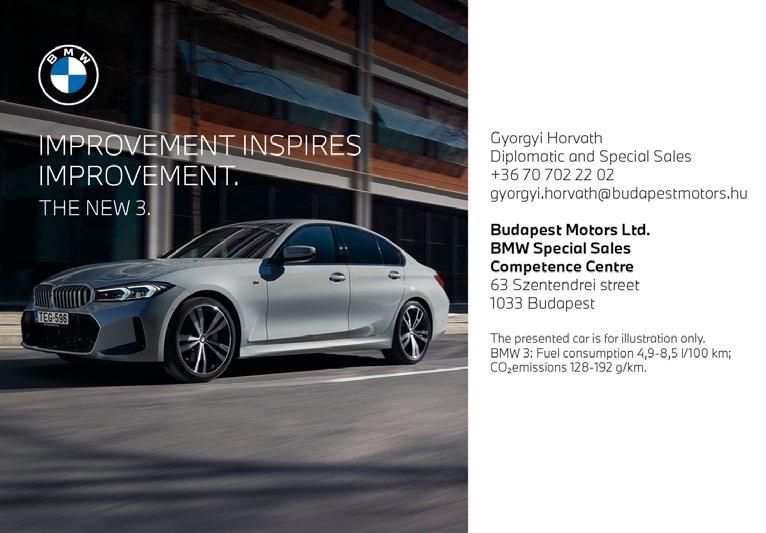
United Kingdom



Bilateral ties between Hungary and the UK have become of a different order of magnitude following Brexit, the UK Ambassador to Hungary, Paul Fox tells Diplomacy &Trade in the leading article of the British Focus. He also talks of the Embassy’s efforts in reducing the “degree of friction” appearing in UK-Hungary (and UK-EU) relations due to Brexit as well as of dynamic economic relations with the volume of bilateral trade increasing to GBP 7 billion.
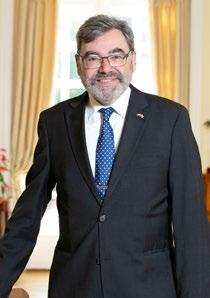
CEOs for Balance


see articles on pages 10-21



















page 17
In an exclusive interview with Andrea Solti, President of the Hungarian Business Leaders Forum (HBLF) and Country Chair of Shell Hungary Plc., Diplomacy&Trade explores HBLF's commitment to championing social causes and promoting diversity and equality in the business sector. With a focus on HBLF's involvement in the European Diversity Month, she sheds light on the initiatives and programs undertaken to create a future that belongs to everyone see article on page 08
2023/IV HUF 1710 EUR 6
FOCUS country



TAKENAKA EUROPE GmbH HUNGARY BRANCH OFFICE Architecture / Engineering / Construction www.takenaka.eu info@takenaka.hu
ASPIRING TO FINE FORM for a future generation
letter from the publisher
“This place radiates the feeling of belonging, belonging to people staying in such hotels such as Four Seasons.” This how the new General Manager of the Four Seasons Hotel in Budapest, Thibaut Drege explains in an interview with Diplomacy&Trade one of the attractiveness of the establishment located in the historical Gresham Palace overlooking the Chain Bridge on the River Danube.
The country in focus in this edition is the United Kingdom on the occasion of the recent coronation of King Charles. With Brexit, Hungarian-British relations have become somewhat more complicated on a practical level. The British ambassador to Hungary and the embassy team is working on reducing the difficulties result from the UK’s departure from the EU common market. In the meantime, bilateral economic relations are improving thanks in large part to the British businesses operating in Hungary – many of these also appear in the present British Focus.
Diversity continues to be an important issue on the corporate scene in Hungary. In our interview, the President of the Hungarian Business Leaders Forum (HBLF) emphasizes the organization's commitment to thought leadership, value creation, and making a positive economic and social impact. This May, HBLF, which represents the European Diversity Charter in Hungary, was again an active participant of the European Diversity Month events in Hungary, embodying the commitment for diverse workplaces and inclusive societies.
The challenge for family businesses in Hungary lies in striking a balance between maintaining the family-like nature of the business while embracing the professionalism associated with multinational corporations. That was one of the important findings at the 5th International Family Firm Conference held in Budapest to shed light on the immense potential of family businesses in this country.
The regular column WittyLeaks is authored by the Egyptian Ambassador who characterizes Budapest as ‘the city of beauty and life’ and characterizes the cultural richness, characteristic delights – and even the pet-friendliness – of the whole country that he has been keen to discover with his family.
Our wine page features REDy, characterized as ‘the brighter face’ of the Villány wine region in southern Hungary. REDy was brought to life four years ago and has been thriving ever since, thanks to the enthusiasm of producers and the positive feedback from consumers.

We are so glad to see that the summer tourism season is in full swing, many outdoor activities provide ample opportunities for tourists and locals alike to enjoy Budapest and the countryside alike without the stress of COVID restrictions. Enjoy!
Peter Freed PUBLISHER

cont en ts
22-23 BUSINESS
Conference on family businesses
24 WITTYLEAKS
by the Ambassador of Egypt
PUBLISHER: Peter Freed PHOTO EDITOR: Dávid Harangozó
SALES & MARKETING DIRECTOR: Tamás Varga ADMINISTRATION: Blanka Szalontai
CONTRIBUTORS: Edith Balázs, Sándor Laczkó, Tamás Magyarics, Mohamed El Shinawy
PHOTO CONTRIBUTORS: Enikő Várai (cover), Miyu Productions Facebook, grapevine.hu, depositphotos.com, Budapest Airport/Róbert Barany, Masterplast, ceglass.eu, HBLF, Isaac Mayne/DCMS, Katie Chan, Provident, BAT, Land Rover, GSK, István Bielik, Embassy of Egypt, French Institute of Budapest, Madame Tussauds Budapest, Vera Éder, VeszprémFest, REDy Villány, Csaba Barbay, Enikő Várai, MTI Photos: Lajos Soós, Tibor Rosta, Zoltán Máthé
09 ANALYSIS
Summit for a New Global Financing Pact
10-21 BRITISH FOCUS

Interview with Ambassador Paul Fox; British Chamber of Commerce in Hungary; The coronation of King Charles III; Provident; BAT; British Council; GSK; Land Rover
25 WHAT’S ON Concerts, festivals, events and exhibitions in and out of Budapest
26 WINE
REDy from Villány
27 HOSPITALITY
Interview with the General Manager of the Four Seasons Hotel Gresham Palace in Budapest

DUTCH FOCUS – COMING SOON

Diplomacy&Trade – in cooperation with the Dutch Embassy in Budapest – presents a special Focus section on relations between Hungary and the Netherlands. The Netherlands is Hungary's 9th most important trading partner, bilateral economic cooperation has a significant impact on the performance of the Hungarian economy: 800 Dutch companies employ about 22,000 Hungarians while Dutch investment in Hungary is worth EUR two billion. Trade volume between the Netherlands and Hungary – imports and exports combined – is nearly EUR 10 billion. The compilation includes an extensive interview with Ambassador Désirée Bonis discussing economic ties, cultural and civilian cooperation. Of course, we also present the activities of the Netherlands-Hungarian Chamber of Commerce in Budapest and several of the Dutch ventures operating in Hungary.

2023/ I V |DIPLOMACY & TRADE| www.dteurope.com 4 Copyright 2004-2023 DUAX Kft., all rights reserved ISSN 1589-8075 This magazine is produced by DUAX Kft. The opinions published in the magazine do not necessarily reflect the opinions of DUAX Kft. photo by REDY VILLÁNY, VERA ÉDER, ISTVÁN BIELIK, DEPOSITPHOTOS.COM We welcome inquires for advertising in this issue. PLEASE CALL TAMÁS VARGA FOR FURTHER INFORMATION +36 209 350 250 - tvarga@budapestweek.com AND DON’T FORGET monthly in print - daily on the web www.dteurope.com COPIES ARE AVAILABLE AT SELECTED RELAY AND INMEDIO OUTLETS IN MAJOR HUNGARIAN CITIES. NEWSSTAND PRICE: HUF 1,710 or EUR 6 - Subscriptions are available for an annual fee of EUR 72 in Hungary, or EUR 90 to all other destinations. SEND REQUESTS AND INQUIRIES TO DUAX KFT. H-1034 Budapest, Bécsi út 60. TELEPHONE [+36-70] 320-3051 FAX [+36-1] 350-5660 E-MAIL editor@dteurope.com | ADVERTISING tvarga@budapestweek.com 05 ON THE RECORD 06-07 COMPANY BRIEFS 08 DIVERSITY Spearheading positive change
Event guide to the Hungarian capital page 25
5th International Family Firm Conference pages 22-23 The latest vintage of REDy from Villány hits the shelves page 26
on the record
Palincsár said. 82% of shoppers take part in various promotions, reinforcing a trend that was already strong, he added. According to the survey, consumers are spending the same amount on items such as food and medicine as a year ago, and have not cut back on communication services. They are spending less on household appliances, shoes and clothing, and travel, among other things. 77% try to have broken things repaired. 34% of shoppers will give up their favorite item if they can replace it with an acceptable alternative for less money, while 25% will hold on to the product but buy it less often. 17% of respondents are buying more often from own-brand shops.
MTA PRESIDENT CALLS FOR ‘MEANINGFUL COOPERATION’
"Only a meaningful academic role and cooperation between the Academy and the government can bring about a stable, predictable and efficient national RDI system that goes beyond governmental cycles, and the utilization of the results to strengthen the nation," President of the Hungarian Academy of Sciences (MTA) Tamás Freund said in his welcome speech at the academy’s General Assembly this May.
As he stated, "it is a basic truth in science, but it is also a fact of experience in politics, especially in policy-making, that not everyone who nods at everything helps us achieve our goals. Rather, it is the one who engages us in debate. This is particularly true when there is agreement on the initial assessment of the situation and when the intention and the goal are shared."
In his presentation to the Assembly, he recalled that the Academy has been drawing the attention of decision-makers to the negative trends in Hungarian public education for many years. He confirmed that the MTA would continue to offer the knowledge and experience of its members and bodies, in particular the Scientific Committee for Pedagogy and the Presidential Committee for Public Education, to help create the conditions for a scientifically sound, modern public education.

MAJORITY OF HUNGARIANS TRY TO CUT SPENDING


86% of Hungarian consumers are trying to cut their spending, according to research by Ernst&Young international consultants.
Price and value for money are the two most important criteria when buying a home. 79% of respondents said that price was the deciding factor for them in most cases for all products. “The least influential factors are advertising or brand awareness," the head of brand, customer and marketing services at EY, László
FURTHER INCREASE OF ELECTRONIC PAYMENTS
Electronic payments infrastructure further expanded in the first quarter of 2023 in Hungary and turnover in the payment systems rose significantly over this period. In addition to the more than 50,000 new accounts, the number of cards in active use also increased. On the acceptance side, the number of acceptance points both in the physical and online space increased by 4-5% in a quarter, the National Bank of Hungary (MNB) reported.
Electronic payments continue to be secure, with frauds linked to card transactions being the most common method is phishing and the value of the losses to cardholders continuing to rise, the statement added.

FOREIGN TOURISTS RETURNING TO HUNGARY
Based on the numbers of inbound tourism so far this year and summer bookings, the number of foreign tourists was already approaching the levels before the epidemic, Tamás Flesch, President of the Association of Hungarian Hotels and Restaurants, said this June.
Foreign tourists are rediscovering Hungarian tourism this year after the pandemic, and summer bookings are flooding into hotels.
Most of them are coming from Israel, Western and Eastern Europe, but more and more Chinese tourists are also expected, he added. This was already reflected in hotel turnover at Pentecost, when domestic guests also arrived in far greater numbers than had been expected. But internationally renowned sporting events also play a big role in this, as they are always a big attraction abroad and help Budapest to be full and generate high revenues, Tamás Flesch said.
Among the events attracting the most visitors to the Hungarian capital, he mentioned the football Europa League final and the festival organized for the 120th anniversary of Harley Davidson.
UPCOMING NATIONAL DAYS
June
2 Italy Republic Day
5 Denmark Constitution Day
6 Sweden National Day
10 Portugal Portugal Day
12 Russia Russia Day
12 Philippines National Day
17 United Kingdom King's Official Birthday
17 Iceland National Day
23 Luxembourg Grand Duke's Official Birthday
25 Slovenia Statehood Day
25 Croatia Statehood Day
July
1 Canada National Day
3 Belarus National Day
4 USA Independence Day
5 Algeria Independence Day
5 Venezuela Independence Day
9 Argentina Independence Day
13 Montenegro National Day
14 France National Day
21 Belgium National Day
23 Egypt National Day
28 Peru Independence Day
The number of payment accounts managed by payment service providers in Hungary exceeded 10.8 million, due to over 50,000 new accounts opened. In particular, the number of accounts held by natural persons grew, further increasing the banking coverage of the population, and the share of accounts available online also continued to increase. The number of payment cards used for purchases continued to increase, despite a slight decrease in the total number of cards. In this quarter, 70.5% of the cards were used for purchase transactions. Within one quarter, the number of cards registered in mobile wallet applications increased by 6.7%, indicating a further spread of innovative payment methods. Compared to the previous quarter, the number of merchant acceptance points belonging to the network of domestic payment service providers increased. The number of merchant acceptance points rose by 4.6% to 146,000 while the number of POS terminals operating at these points increased by 6.2% to 243,000. 97% of these instruments are already enabled for contactless payments.
HUNGARIAN DIRECTOR WINS SHORT FILM PALME D’OR IN CANNES
Hungarian director Anna Buda Flóra's animated film '27', a French-Hungarian co-production, has won the Palme d'Or for Best Short Film at the 76th Cannes International Film Festival.

The 11-minute-long film is about 27-year-old Alice who, even though she is suffocating a bit, she still lives with her parents and tends to live in her dreams to escape her dreary everyday life. After a psychedelic party on a factory roof, she has a serious drunken bike accident.
Anna Buda Flóra told MTI in Cannes that she had been working on her animation 27 for ten years and wanted to make a film about the housing crisis.
"The film is about how a young woman's sexual fantasies are linked to the confinement she experiences as an adult living with her parents. So, I made a social porn," she stressed.
Selected from 4,288 films, eleven shorts, coming from twelve countries (Argentina, Colombia, Spain, the United States, France, Hungary, Indonesia, Iceland, Norway, Poland, the United Kingdom and Ukraine), were presented this year in Competition. The Short Film Palme d'Or prize was handed over by the Jury, chaired by Hungarian film director Ildikó Enyedi, during the closing ceremony of the festival.
The last time a Hungarian production won the main prize at the Cannes Short Film Competition was in 2002, with Péter Mészáros' short film After the Rain, and before that, Marcell Iványi's film Wind was awarded the Palme d'Or in 1996.
www.dteurope.com |DIPLOMACY & TRADE| 2023/ I V 5 photo by LAJOS SOÓS/MTI, DEPOSITPHOTOS.COM, MIYU PRODUCTIONS FACEBOOK
company briefs
GRAPE-VINE LTD. EXPANDS CAPACITY WITH EU SUPPORT
Grape-Vine Ltd. has expanded its capacity at its site in Kiskunmajsa, SE Hungary with a new storage hall and the purchase of wine processing equipment with a total of HUF 769 million in European Union funding.
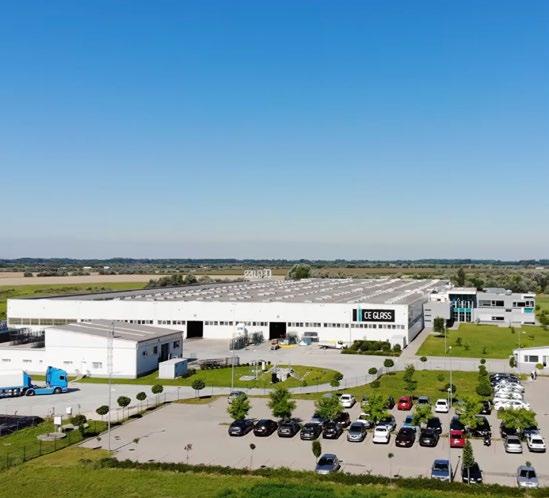
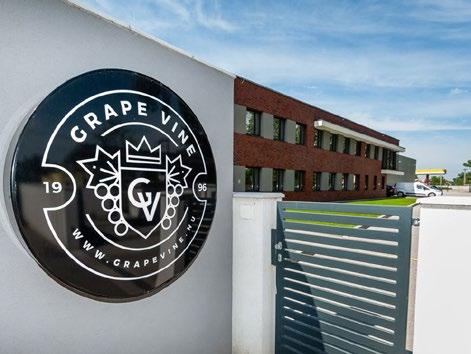
One of the managing directors of the company, Róbert SzőkeTóth said that the investment was made with the support of HUF 462 million won in the Economic Development and Innovation Operational Program (Ginop) and HUF 308 million of their own resources. In the last year and a half, a new building was constructed at their site in Kiskunmajsa, S Hungary, to store wine raw materials and finished products, expanding the previously limited storage capacity. They have also purchased wine processing equipment, including tanks, filters, a nitrogen generator, a grape crusher
BUDAPEST'S MAIN AIRPORT PROMOTED TO A 4-STAR AIRPORT

The Ferenc Liszt International Airport of the Hungarian capital has been ranked in the same category as Europe’s best airports, the management company Budapest Airport said in a statement. The recognition is further validation for Budapest Airport and the airport community that the series of developments worth HUF one hundred billion forints, implemented over the past four years, is appreciated by the traveling public.
In March this year, the international aviation research organization Skytrax conducted a three-day audit of the quality of services at the Ferenc Liszt International Airport, taking into account five hundred criteria, and upgraded the airport’s rating from three to four stars. This means that, following a number of prestigious awards this year, the gateway to Hungary has been put in the same league, in terms of the travel experience, with airports such as London Heathrow, Amsterdam Schiphol, Barcelona and Vienna, amongst others. Similarly to the classification of hotels, the independent experts use a ranking of 1 to 5 stars, but tailored to airports. The rating process was based on more than 500 performance indicators, covering all services and areas that passengers may encounter.
The auditors highlighted as a positive example for other airports our fast and efficient security screening without long queues, the displaying of waiting times in many places, the uniquely aesthetic design of the airport, the recently opened children’s play area and various facilities for disabled passengers, equipped with a hospital bed and hoisting equipment in Pier 1. The inspectors also considered exemplary the free use of high-quality strollers and the availability of baggage trolleys in large numbers.
MASTERPLAST REPORTS FALLING Q1 REVENUES

As a result of the significant decline in the construction market and lower demand, the building insulation materials firm Masterplasts's revenue decreased by 27% in the first quarter of 2023.
According to the company report published on the website of the Budapest Stock Exchange, in the sharply competitive market, Masterplast was only able sell its finished-products with reduced margins, produced from previously purchased raw materials at higher prices. Besides, the lower utilization of production capacities also had a negative impact on profitability. As a result, the company's EBITDA for the first quarter represents a loss of EUR 2,032,000 (EBITDA margin of -5,4%). Unfavorable exchange rate movements for the Group further increased the loss, so the company closed the first quarter with a loss after-tax of EUR 5,837,000.
In response to the changed market conditions, the company focused on reducing operating costs, optimizing production and inventory levels, and more efficient energy management.
The company has restructured its management, reviewed its processes and launched significant staff optimization in the manufacturing and the operations. The company expects a significant improvement from the second half of the year, where – probably strengthened by the start of the European-level energy efficiency building renovation wave –the industrial environment may intensify and the efficiency measures taken by the company would have a positive impact. In line with the listed impacts, the company revised its EBITDA earnings forecast for financial year 2023 to EUR 8 million.
With the EU measures in line with the EU's energy policy objectives, the company's medium-term business prospects in the thermal insulation market have strengthened.
According to the company's updated medium-term profit forecast, Masterplast could return to its original growth path from 2024, and by 2026 the annual profit after tax can exceed EUR 30 million. Based on these, the company continues to implement the intensive investment strategy that lays the foundation for the growth path.
with pump and a pneumatic grape press. The company also purchased five electric forklift trucks for material and goods handling.
The new equipment will greatly improve production efficiency, increase quality and expand current capacity, but the investment is also significant in terms of energy efficiency, he added.
The other managing director of Grape-Vine Ltd., Lajos Eiler, recalled that the winery was founded together with his friend, Róbert Szőke-Tóth, back in 1998, when they bought the former Jonathán Cooperative winery, which had a long history. Since then, the Kiskunmajsa-based winery has become one of Hungary's leading wineries and is increasingly known not only in Hungary but also beyond its borders, he added.
He pointed out that an average of 8.5 million bottles are produced annually from the ‘La Fiesta’ range, the country's best-known wine brand, which offers a wide assortment of wines ranging from sweet to varietal.
CE GLASS PRODUCTION CAPACITY EXPANDED
CE Glass Plc. has expanded its thermal insulating glass production capacity at its plant in Szatymaz, on the outskirts of Szeged, SE Hungary, with EU support, and thanks to the development, the energy consumption per product and the reject rate have been reduced. According to the statement, HUF 400 million of the HUF 815 million investment costs were covered by non-refundable EU subsidies. Insulated glass structures, which have been in use since the 1970s and 1980s, have become two- or three-layered as technology has developed, with argon or krypton gas with poor heat transfer properties between the individual layers of glass to increase the thermal barrier properties of the system. Recent market needs and requirements, and subsequent architectural technologies, are pointing towards four- and five-layer glass structures, which offer even better performance due to the additional layers of glass and the air gaps between them.
The investment in CE Glass Plc. is the first in the country to enable the manufacturing of these products. A new laminating machine has been acquired, which operates with an innovative and energy-saving heating and convection process, shortening the previous four- to six-hour firing cycles to one to two hours. The energy consumption per product can be reduced by up to 50%.
A vertical CNC machining center has also been installed, which reduces the stress on the glass structure, virtually eliminating stress fracture. This not only reduces the scrap rate by 30-40%, but also significantly increases the lifetime of the products manufactured.
The project also involved the expansion of the company's production area. The products manufactured with the new technology can be used as large safety glass in office buildings and entertainment facilities, reducing the energy needed to operate the buildings by 30-40%. Thanks to the higher light transmission of the glass surfaces, electricity consumption can also be significantly reduced.
2023/ I V |DIPLOMACY & TRADE| www.dteurope.com 6
photo by GRAPEVINE.HU, BUDAPEST
AIRPORT, MASTERPLAST, CEGLASS.EU
company briefs

HUNGARY'S FIRST HYDROGEN PRODUCTION PLANT INAUGURATED




As part of the Akvamarin project, Hungarian Natural Gas Storage Plc. has installed a 2.5-megawatt electrolysis system and associated hydrogen gas production technology at the Kardoskút underground gas storage facility in SE Hungary. The cost of the R&D project was HUF 5.6 billion, of which HUF 2.5 billion was provided by the state.
The CEO of Hungarian Gas Storage Plc., Ákos Kriston, explained that with the help of an








SUSTAINABLE JET FUEL TESTED AT BUDAPEST’S MAIN AIRPORT
The Hungarian oil and gas company Mol, the airliner Wizz Air and Liszt Ferenc International Airport are testing a Sustainable Aviation Fuel (SAF) blend. The fuel was purchased by Mol from the Finnish company Neste. Wizz Air's flight to Paris took off on Wednesday filled with this fuel as part of the test.
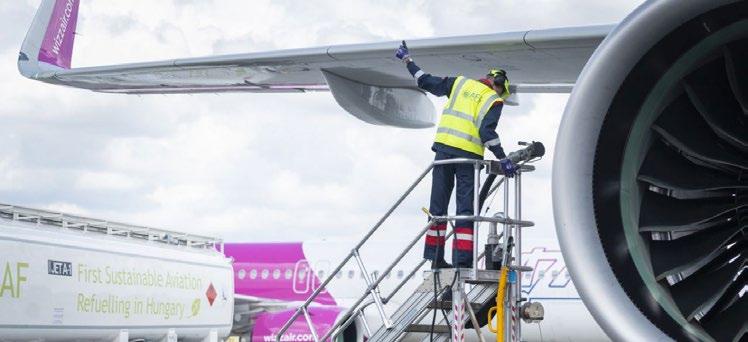
At the press conference prior to the refueling, Chris Dinsdale, the outgoing CEO of Budapest Airport, the management company of the Ferenc Liszt International Airport, stressed that it is important for air transport to become sustainable, and that airports, airlines and partners must work together to achieve this.
He added that Budapest Airport is looking into the process of sustainable aviation refueling to be prepared to serve airlines with a more significant amount of innovative fuels.

The Managing Director of Mol Group's Fuel Business Unit, Csaba Zsótér, said that their strategic goal is to launch a circular economy in the region, and sustainable aviation fuel can help them achieve this. He pointed out that they are constantly testing new technologies and developing their products to strengthen the region's security of supply with lowcarbon fuels and accelerate the green transition.
Wizz Air's Director of Sustainability, Yvonne Moynihan, said the company has the lowest carbon emissions per passenger kilometer compared to its competitors and is continually striving to further reduce emissions. The new-generation jet fuel being tested is made from renewable waste and residual raw materials, produced in a sustainable way. The Neste fuel is compatible with existing aircraft engines and airport infrastructure, so it does not require any investment to use it.
electrolysis – water decomposition – unit, using electricity, the tap water is decomposed into hydrogen and oxygen, and the hydrogen is stored after pressure boosting. There are two possible uses: as a raw material, to sell the hydrogen in tankers; or to use it as a gas feedstock for natural gas, blended with gas-fired compressors. The benefit of the project is that the surplus electricity generated by renewable energy sources (solar panels) in the electricity system can be
stored in large quantities, up to several hundred megawatts, in the form of hydrogen for long periods of time, even months, and can be recycled as electricity on demand, he explained. He underlined that no completely new infrastructure had been built in Kardoskút, the existing natural gas storage facility had to be adapted for the project. For now, they can produce a small amount of hydrogen, 400 cubic meters per hour.
NEW REGIONAL R&Đ CENTER BY NOVARTIS
Having a tradition of over 250 years, the establishment of Novartis’ Hungarian operation dates back to the early nineties. As part of its structural optimization, the Swiss-owned corporation now strengthens its presence by setting up a regional R&D center in Budapest. Apart from its core research functions, the facility will play a crucial role in coordinating related activities in several countries. Novartis Hungária Ltd. is already conducting 65 active clinical researches in the country in collaboration with numerous universities, research institutes and 19 hospitals. The new facility aims to enhance the role of the Hungarian operation as it will become
responsible for coordinating clinical research activities in more than 12 countries and will also significantly increase its headcount bringing new highly skilled jobs to Hungary. The ambitious plans require pushing up headcount in the R&D section as well. The fact that more clinical research will take place in Hungary has many benefits. Among others, Hungarian patients gain access to new medical solutions, whereas doctors can also benefit professionally. New capacities are thus created in Hungary thanks to Novartis’ commitment to implement largescale developments in the field of data sciences, technologies and innovative research methods.
www.dteurope.com |DIPLOMACY & TRADE| 2023/ IV photo by TIBOR ROSTA/MTI, DEPOSITPHOTOS.COM, BUDAPEST AIRPORT/RÓBERT BARANYI, ZOLTÁN MÁTHÉ/MTI
C M Y CM MY CY CMY K
VÁCI UTCA 9. H-1052, BUDAPEST
LUXURY EYEWEAR AND OPTIC
SPEARHEADING POSITIVE CHANGE
HBLF PRESIDENT DELIVERS KEYNOTE SPEECH AT OPENING OF EUROPEAN DIVERSITY MONTH
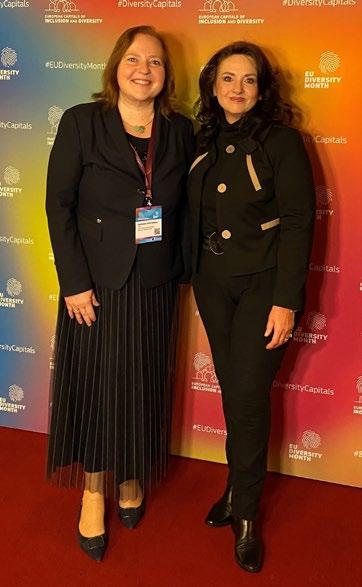


In an exclusive interview with Andrea Solti, President of the Hungarian Business Leaders Forum (HBLF) and Country Chair of Shell Hungary Plc., Diplomacy&Trade explores HBLF's commitment to championing social causes and promoting diversity and equality in the business sector. With a focus on HBLF's involvement in the European Diversity Month, she sheds light on the initiatives and programs undertaken to create a future that belongs to everyone.
is to celebrate organizations’ efforts that help build equal and inclusive environments for all. As an invited speaker at the opening ceremony of the European Diversity Month, Andrea Solti presented the positive strides made by HBLF and Diversity Charter Hungary. She emphasized the importance of leadership commitment, visibility and consistent policies that support diversity at every level, from recruitment to leadership development. She highlighted best practices from companies like Tesco and Shell on their approaches to diversity reporting and promoting family-friendly employment policies. The executive showed a powerful video featuring 100 Hungarian CEOs joining the "Let's Give Women Also Endless Opportunities" campaign, exemplifying the essence of this year's Diversity Month motto. “We are very proud that HBLF was invited to deliver a speech at the event. I believe that this invitation is a recognition that we have a positive story in the Hungarian business sector: HBLF and Diversity Charter Hungary organized the second highest number of events in 2022 in Europe and our programs are highly appreciated on EU level,” Andrea Solti explained.
Empowering Women
Gender equality is a core focus for HBLF and many of the events organized as part of the Diversity Month are centered on this topic. Some of HBLF’s most notable campaigns and programs, launched over the years, have also been designed to promote gender equality in Hungary, Andrea Solti emphasized the organization's response to the EU directive on gender balance on corporate boards. Under the law adopted last November, listed companies will need to have 33% of the underrepresented sex among all directors by 2026.
Throughout its 30-year history, HBLF has centered its efforts on relevant and forward-looking topics that hold significance for the Hungarian business sector and its member companies, Andrea Solti, HBLF President and Country Chair of Shell Hungary Plc., told Diplomacy&Trade in an interview. The executive emphasized the organization's commitment to thought leadership, value creation, and making a positive economic and social impact. “Our mission is creating a future that belongs to everyone. Diversity and inclusion are important pillars of that mission,” she said.
European Diversity Month
The HBLF, which represents the European Diversity Charter in Hungary, has been actively participating in the European Diversity Month for the past three years. The European Diversity Month embodies the EU's long-term commitment for diverse workplaces and inclusive societies. Organized during the month of May under the motto ‘United in Diversity’, the initiative aims to raise awareness about the importance of diversity and inclusion in the workplace and across our societies. The European Commission’s goal
In line with this, HBLF launched the ‘CEOs for Balance’ initiative, pairing 12 CEOs (six women and six men) to work together as ambassadors for gender balance. Complementing this initiative, HBLF's Executive X Mentor program supports the development of women leaders aspiring to board positions. The program's success is evident with over 150 participants enrolling this year. “Visible leadership commitment is crucial for fostering diversity and gender equality in the Hungarian business sector. The CEOs for Balance program is a great example of this,” Andrea Solti said. She added that sustained efforts and a multi-faceted approach are necessary, acknowledging that change cannot be achieved overnight. While Hungary currently lags with only around 10% female board representation, Andrea Solti stressed the dedication of CEOs from HBLF member organizations to support gender equality initiatives. The increasing number of organizations joining the Diversity Charter also exemplifies the commitment and interest within the Hungarian business sector.
For the HBLF President, social responsibility extends beyond the confines of individual companies; it means leaders must take responsibility for broader economic and social topics. The ROMASTER talent care program, launched by HBLF in 2007 to promote tertiary education and language skills within Roma society, serves as a prime example of this commitment. “There is a need for broad collaboration and impactful programs to progress toward a world where leadership and decision-making bodies mirror the composition of society,” Andrea Solti concluded.
2023/ IV |DIPLOMACY & TRADE| www.dteurope.com
8 photo by HBLF
diversity
HBLF PRESIDENT ANDREA SOLTI (IN THE MIDDLE) WITH HBLF HONORARY PRESIDENT BORBÁLA CZAKÓ (ON THE LEFT) AND THE MEMBER OF THE HBLF BOARD IN CHARGE OF THE EU DIVERSITY CHARTER, ZSUZSA GÁRDUS
ANDREA SOLTI WITH THE EUROPEAN COMMISSIONER FOR EQUALITY, HELENA DALLI
MUCH ADO ABOUT NOTHING?
’NO COUNTRY SHOULD HAVE TO CHOOSE BETWEEN FIGHTING POVERTY AND FIGHTING FOR THE PLANET’
BY TAMÁS MAGYARICS
A ’Summit for a New Global Financing Pact’ hosted by President Emmanuel Macron was taking place in Paris on June 22-23. The event went down almost unnoticed in the international media. Or, at least, was pushed into the background by such much more spectacular events as the ongoing tragicomedy or farce of Mr. Trump’s and Mr. Biden’s colorful political lives and the surrounding hype with a view to the upcoming U.S. presidential election in November 2024. Then, there was Secretary Blinken’s visit to China, and the speculations of what was really going on between the two sides behind closed doors. Of course, the Russo-Ukrainian war has been dominating the headlines for months; some new twist was added to story by the antics of the Wagner Group and its shady leader, Yevgeny Prigozhin. The truth is, the issues raised and discussed at the Summit seem to be as consequential for our future as some of the above mentioned more flashy events.
Kicking the can down the road
This latter observation does not seem to have been shared by some of the major countries. Neither the US President, nor the Canadian Prime Minister or the British Prime Minister was attending the conference. John Kerry, President Biden’s special envoy declared that the U.S. did not have a position on questions such as, for instance, potential taxes on shipping, aviation or fossils fuels – about half the countries present, some 20, would like to use the
funds thus collected to assist those nations which are hardest hit by climate disaster. John Kerry, instead, called on the Chinese to be more generous in funding environmental projects, and making larger efforts to reduce carbon dioxide emission. In reality, the climate issues did not constitute the core ones in the summit; a less generous interpretation is that the participants kicked the can down the road, that is, to the UNCOP28 climate summit this winter in Dubai. The explanation is quite obvious: according to rather conservative estimates, the developing countries would need about USD 2.4 trillion a year to reduce emissions and deal with climate change problems. Though it is more than a drop in the bucket, the World Bank is willing to suspend the debt payment for countries hit by climate disaster – though there is a hitch here too: the offer applies only to new loan agreements, and it does not cover the older ones.
Deals and promises
The real issue was what the French put it pithily: ’no country should have to choose between fighting poverty and fighting for the planet.’ The emphasis was on the former part of the sentence; to be more precise, about the debt questions and the future of financing by, among others, the World Bank and the International Monetary Fund. The developing countries, almost without exception, are in debt up to their neck, and servicing them together with trying to take their share in fighting climate change is a problem no one has really
been able to solve yet. The Paris Summit is very much likely to fall into this category: nice speeches were made with public demonstrations of solidarity and willingness to help, but the actual outcome was more sobering. There were few concrete proposals, though. One, a number of deals were concluded with individual countries. Thus, for instance, a debt restructure package was offered to Zambia, while a USD 2.7 billion ’just energy transition partnership’ was agreed on with Senegal. Two, on a broader scale, the IMF and the World Bank have promised to introduce changes in their operations which are likely to make it easier for countries in need to receive funds from these financial institutions. The incoming World Bank President, Ajay Banga hinted that the institution’s priorities would include fighting climate change besides helping people out of poverty.
Widening gap
However, the continuing and substantial financial assistance is to be covered by taxes on shipping and aviation, that is, moneys paid primarily by the rich countries – though they are more reticent in this question than not. Besides John Kerry, Secretary of the Treasury Janet Yellen was also quite reserved about the idea put forward by President Macron: she indicated that her government would ’consider’ it, but she did not make any specific commitment. Another proposal is the so-called Bridgetown Initiative by Barbados, which wants USD 100
billion a year committed to cover climate loss and damage. Looking beyond governments and international organizations as parts of the solution, private enterprises may as well play a fairly important role in helping the developing countries to address poverty, climate change and more – if they invested massively in these nations. The big corporations and the mediumsized enterprises are rather cautious: they refer to a host of difficulties from poor infrastructure through not properly skilled labor to uncertain political and economic environment. Therefore, for example, 90 percent of investments in renewable energy globally go to the industrial world and China, with the end result of widening the gap between them and the ’third world’.

Need for actual actions
Shakespeare’s Much Ado About Nothing is a comedy, in which, in accordance with the unwritten rules of the genre, things are sorted out by the end of the play. A high number of scientists are warning us that the current state of the world is not heading in the direction of a happy ending, if we continued previously failed practices, including endless and fruitless and self-serving ’summits’ which have produced more empty promises and declarations than actual actions. Let us hope that the ’Summit for a New Global Financing Pact’ was an exception to the rule. Hope dies last.
Tamás Magyarics is a foreign policy analyst
analysis www.dteurope.com |DIPLOMACY & TRADE| 2023/ I V 9 photo by DEPOSITPHOTOS.COM
UK AND HUNGARY: A THICKER AND MORE COMPLEX RELATIONSHIP
PAUL FOX
BY EDITH BALÁZS
Bilateral ties between Hungary and the UK have become of a different order of magnitude following Brexit, UK Ambassador to Hungary Paul Fox tells Diplomacy &Trade. Despite political differences over the war in Ukraine and Sweden’s NATO accession, the two countries are enjoying a more direct relationship and economic cooperation is growing dynamically. The Ambassador took up his current posting over two and half years ago, during which time he has travelled to all corners of Hungary. “Being stuck in the capital all the time is not how one gets to know Hungary. One of my predecessors used to say that Budapest is not Hungary, and Hungary is not Budapest. This definitely has a ring of truth to it. I have travelled throughout the country to understand what Hungary is really like, that is one of the practical ways of achieving my mission here,” he says in an interview.
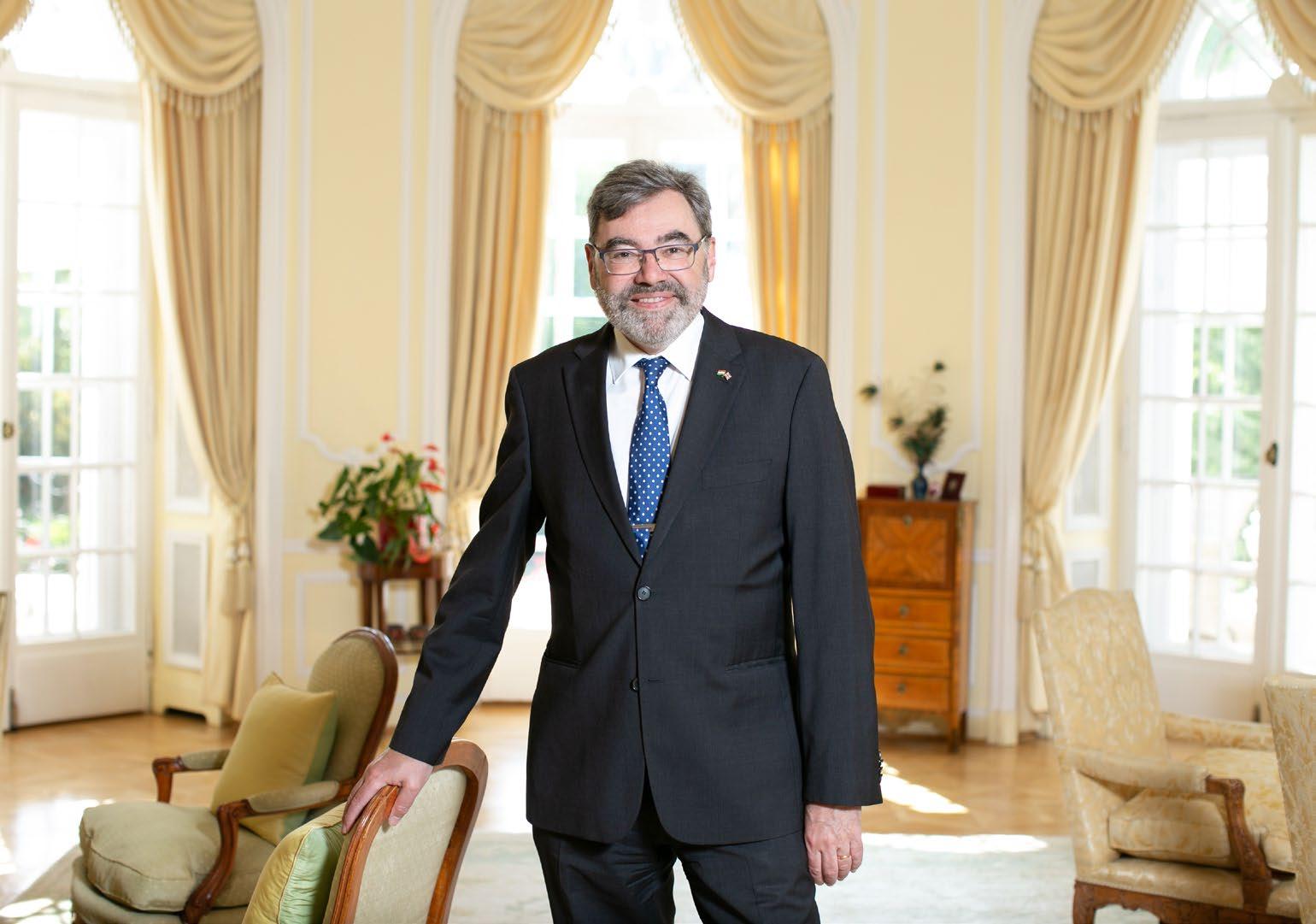
A deep love for the region


Paul Fox has represented the UK in several countries, some in this region. In fact, his previous post before coming to Budapest was Moscow where he worked as Minister Councilor. “It was a difficult posting as it was right after the attack on British citizens by members of the Russian intelligence services and bilateral relations were at a difficult point,” the Ambassador remembers. He also served as Deputy Ambassador in Poland and many years ago, as Deputy Ambassador in Azerbaijan, not long after the collapse of the Soviet Union.
“I have quite a strong feel for this region. It really started at university; at Oxford, I did a Masters in Russian and Eastern European studies and I did a doctorate in Russian history. There is a deep love in me for this region that goes back many years. Given all that experience, I view Hungary in a regional context, as part of Central Europe.
2023/ IV |DIPLOMACY & TRADE| www.dteurope.com 10 photo by DÁVID HARANGOZÓ, DEPOSITPHOTOS.COM
INTERVIEW WITH BRITISH AMBASSADOR
british focus
Even though each country in the region is very different, there are common themes and being able to place Hungary within this regional context is very important.”
Building bridges
As part of efforts to foster an even deeper dialogue between the UK and Hungary, the Embassy helped bring to life the Chain Bridge Forum in April. It was the first UK-Hungary bilateral forum, organized jointly by the Hungarian Institute of International Affairs and the British Embassy Budapest in partnership with the UK’s Royal United Services Institute and the British Council. It served as a great opportunity for representatives of government, civil society, and think tanks to exchange ideas and best practices. “We focused on three main areas: security, especially regional security in light of the war in Ukraine, prosperity where we looked at ways in which the private sectors of the two countries could work together to improve prosperity. And thirdly, people-to-people relations, where we primarily focused on how we could improve educational ties, which has become a bit of a challenge since the UK left the European Union,” Paul Fox says. As the UK is no longer a member of the Erasmus program and Hungarian students cannot travel as freely to the UK as before, the two sides need to come up with solutions to overcome these challenges. Participants also looked at various ways for civil society organizations to work together. As part of the Roma Outreach initiative, for instance, people from the UK who are dealing with their own Roma communities compared and exchanged experiences with Hungarian counterparts.
“I see the bolstering of relations between the civil societies of the two countries as a growth area,” the Ambassador adds.
Brexit and points of difference

With the UK’s departure from the European Union, the country’s role within Europe has changed dramatically, Paul Fox says. “Even though what I am going to say may sound as a cliché, it has the merit of being true: We left the EU but we did not leave Europe. We are still a European power and Europe is still our continent,” the Ambassador stresses. As the UK is no longer member of the single market and the customs union and limitations on the freedom of movement of people have come into play, “a degree of friction” has emerged that needs to be overcome. “What we are trying to do is to remove as much friction as possible, whether it be in terms of commercial or people-to-people relationships while respecting the decision of the British people to leave the EU,” Ambassador Fox says.
As a practical manifestation of these changes, bilateral relationships have become more important. “We no longer meet and discuss business in Brussels, as we used to do; we do that now in the various capitals. Our bilateral relations with Hungary are of a different order of magnitude. It’s a thicker, more complex, more energetic relationship as a result of the UK leaving the EU.” Nevertheless, contentious issues do arise, among which the two countries’ differing approach to the war in Ukraine and obstacles to the expansion NATO take center stage.
“The most immediate issue we have is over NATO because the UK wants to see Sweden join as soon as possible and Hungary is one of two countries not having ratified Sweden’s accession to NATO. We want to encourage the Hungarian government to ratify this as soon as possible, certainly, before
the NATO summit in Vilnius scheduled for July,” the Ambassador says.
The war in Ukraine is yet another area where the two countries do not see eye to eye. “The United Kingdom is a very staunch supporter of Ukraine and we will continue to be a staunch supporter of Ukraine. Hungary has taken a different approach. Being so close to Ukraine and worried about escalation, Hungary has advocated a peace narrative, which involves an immediate ceasefire. We are going to disagree on that as we see things from a different perspective. However, this will not undermine the entire relationship,” Paul Fox notes.
The UK wants to ensure that Ukraine is “in the strongest possible position when things come to a settlement” and an immediate ceasefire now would not guarantee that as Russia is in possession of 20% of the country. “We do not see this conflict as a war between Russia and the West or a proxy
war between NATO and the Russian armed forces. This is simply a case of a sovereign country whose sovereignty has been infringed through unprovoked aggression.”
Dynamic economic relations
The value of trade between the UK and Hungary amounts to roughly GBP 6 billion a year and this has increased to GBP 7 billion in 2022. A large array of UK companies have operations in Hungary, such as Tesco, GlaxoSmithKline, Unilever, BT, and Diageo, securing employment to about 55,000 Hungarians. Naturally, there are Hungarian companies established in the UK, WizzAir and property developer Cordia being the most noteworthy.
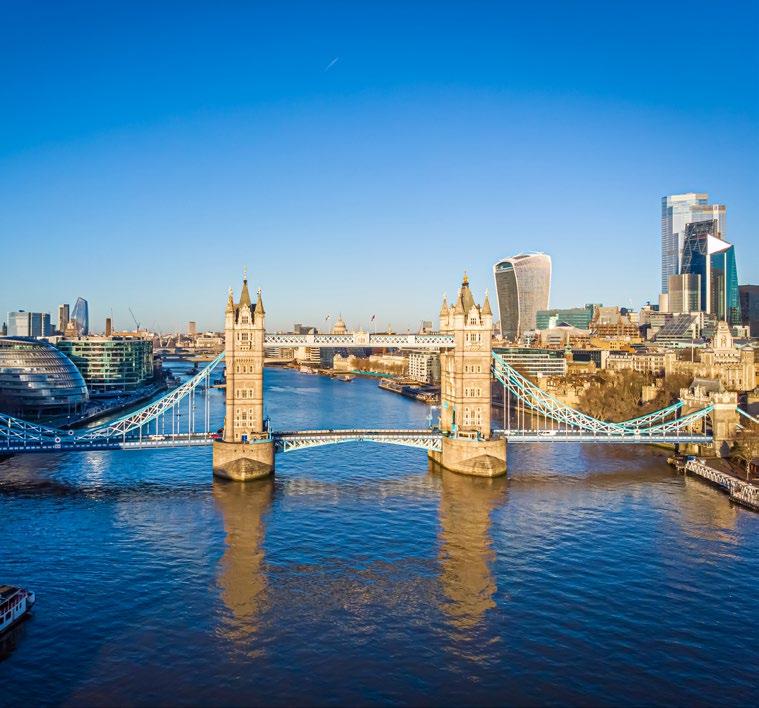
“Overall, it’s a vibrant economic relationship that is growing, but there is room for more growth. Energy is one area that could definitely boost bilateral economic ties as Hungary is keen to diversify its energy supply in order to improve energy security,” Paul Fox says. For instance, the Ambassador has been active in helping Rolls Royce explain its offer for small-modular reactors, which are mini nuclear power plants, to the Hungarian side. Health care as well as defense and security are further areas where cooperation could be deepened, according to the top diplomat.
“The challenge is raising Hungary’s profile because exporters in the UK are still going for the obvious targets: Ireland, France, and Germany, countries that are close and have large markets. However, there are huge opportunities, not only in Hungary but in the eastern flank of the continent in general.”
Freedom of movement limitations
Ambassador Fox concedes that moving to the UK for study or employment is “definitely not as easy as it was” for Hungarians in the aftermath of Brexit. “My job is to keep on promoting people-to-people relationships and keep bolstering them through the work of the British Council and various cultural exchanges,” the ambassador notes.
Tourism does not seem to have taken a hit from the UK’s departure from the EU, as there are about 700,000 British people visiting Hungary every year and large numbers of Hungarians are travelling to the UK. “My country remains keen on attracting the right kind of skills into the local economy; in that sense we remain open to getting talent from this part of the world into the country,” Paul Fox concludes.
11 www.dteurope.com |DIPLOMACY & TRADE| 2023/ IV HUNGARY UNITED KINGDOM AREA 93,028 sq km 243,610 sq km country comparison to the world 110 80 POPULATION 9,699,577 (2022 est.) 243,610 (2023 est.) country comparison to the world 93 22 POPULATION GROWTH RATE -0.31% (2022 est.) 0.49% (2023 est.) country comparison to the world 216 153 BIRTH RATE 8.65 births/1,000 population (2022 est.) 10.8 births/1,000 population (2023 est.) country comparison to the world 211 172 LIFE EXPECTANCY AT BIRTH 77.2years 82.05 years country comparison to the world 92 32 NET MIGRATION RATE 1.23 migrant(s)/1,000 population (2022 est.) 3.23 migrant(s)/1,000 population (2023 est.) country comparison to the world 61 35 REAL GDP PER CAPITA USD 31,000 (2020 est.) USD 45,000 (2021 est.) country comparison to the world 63 37 UNEMPLOYMENT RATE 3.45% (2019 est.) 4.53% (2021 est.) country comparison to the world 48 66 TELEPHONES - MOBILE/CELLULAR 10,332,660 (2020) 80,000,000 (2021 est.) country comparison to the world 88 20 AIRPORTS 41 (2013) 460 (2021) country comparison to the world 103 16 Source: World Factbook
british focus
SHARING BUSINESS EXPERIENCE
BRITISH CHAMBER SERVING ITS MEMBERS SINCE 1991
The British Chamber of Commerce in Hungary (BCCH) has a history of over three decades. Its Chairman, Duncan Graham, who was re-elected at the BCCH General Assembly this May for another two years as head of the organization, tells Diplomacy&Trade about how they managed to handle issues like Brexit, the pandemic or the Russian invasion in Ukraine as well as how the difficulties faced by BCCH members affect accomplishing their environmental goals.

Looking back at the 32 years of BCCH history, the Chairman highlights that the Chamber was instrumental in setting up the EU chamber of commerce as well. “We were one of the founding members and we worked hard to encourage British companies to come here taking advantage of what we considered was a good level of mathematics and a young workforce that were quickly adapting to situations, up until joining the EU. Of course, we were here when Hungary officially became an EU member. So, Hungary was a country for the chamber to establish itself, we were very interested in being part of its commercial growth.” One of the aims of the BCCH is representing British business values that – as the Chairman puts it – are ones based on hundreds of years of experience of world trade. “Great Britain is still a major economy with a global reach and a vast depth of experience. I think that as a chamber, we're able to tap into that with some of our longstanding companies and then try to pass some of that knowledge and experience to smaller firms or emerging companies within Hungary, including Hungarian companies that are interested in trading in the UK.”
Tackling Brexit
The BCCH was here not only when Hungary joined the European Union but also when the United Kingdom left the EU. “I think it was a big change for us and we faced a series of questions that we had never anticipated and thus, we didn't have our answers ready. However, the withdrawal agreement giving a 12-month period for some of these things to come into effect helped us. The other factor is we don't have so many manufacturing companies here. Many of our multinational companies here are effectively electronic: business service or legal centers and a lot of those were largely unaffected. For some of those with a manufacturing base, Brexit brought tariffs and proof of source of origin for products coming into the EU, as a ‘third country’. So, it produced an awful lot of questions for us as a chamber, but our Embassy and our Department for Business and Trade were hugely helpful. We received assistance both from the British and the Hungarian officials but it was a tremendous challenge.” Duncan Graham admits.
Pandemic and war
The past few years have been plagued by crises like the pandemic or the Russian invasion in Ukraine. The Chairman stresses that “when the pandemic
came, we were already on the path to changing working practices. Some of our larger members who have 2,000+ employees in Hungary were already looking at – and had made agreements for – new premises, greener office environments, larger workspace. So, I think the pandemic helped to increase the speed of what was probably going to happen anyway. It also helped moving towards digitalization. For instance, at one of our member companies, there are three Hungarians leading a team of two people in the Philippines and two in somewhere else in the world, online. During the pandemic, there were obviously things that affected us, we couldn't have live meetings with our members, for instance. So, we had to adapt quickly to online presentations, calls, etc. We were not sure whether our members would be satisfied with this new situation and would be worth for them to stay. Fortunately, their answer was ‘yes’, what’s more, with the help of the BCCH team, we've increased our membership – we're nearly 50% up in our membership compared to the pre-pandemic figure.” This Russian invasion of Ukraine brings different problems. “On the one hand, we have British companies and the British government's line,
which is very much in support of Ukraine defending itself, while the Hungarian government is taking a humanitarian approach saying they want negotiation. As a chamber, we're avoiding the political arguments and just trying to help where companies need it. We have had connection with some of the Ukrainian support groups here, who have young Ukrainians, mostly females, looking for a role here and maybe even to settle in Hungary. So, we're helping there as well where we can,” he adds.
CEO dinners
As a unique feature on the chamber scene in Hungary, BCCH organizes CEO dinners, which Duncan Graham notes, have been really popular. “There are a lot of medium-level executives (and small companies) making their way, they are ambitious, especially the Hungarians. They want to meet somebody that's already there and we've had some excellent CEOs at these events, they're very open, very keen. They're not sitting back and saying no, we can't talk. And it's not about boasting whether they’re from Tesco or Shell, they’re not saying that ‘we did this’ or that ‘because we're great’. They're discussing the issues they came up against, and how they got around them. It's an open Q&A session and it's not super strict, not a ‘Chatham House Rules’ when you can't ask certain questions. It's very open, which is really interesting. The participating CEOs are experienced and they perform very well at these CEO dinners. Andrea Solti from Shell for instance, was excellent at sharing with the guests, it was just great to see. I don't think that's originally how we set out to create this event, but it has developed well. We are happy to see major companies are now saying ‘yes, we'd like to be a part of that’. Rolls-Royce Aviation has joined the chamber in the last two months, and they'd like to host a CEO dinner.”
Pros and cons in business environment
Feedback from BCCH members also covers more general issues like the business environment in Hungary. As the Chairman recalls, “there are always complaints but there are good sides as well. There are specific advantages like the very low corporation tax rate or the existence of a knowledgeable work base and that of a good skill set on the positive side. At the same time, some industries have specific difficulties, e.g., the likes of Shell and BP when they have their government stipulations that affect them but generally, the mood is good. True, there is high inflation, which has initially been obviously caused by fuel/food prices going up following the start of this Russian invasion; very, very high food and fuel prices.” This has also affected environmental goals where a lot of companies had a target for moving to zero in terms of emissions and ESG. “Some of those aiming to lower their carbon footprint took a second look because it might be difficult to use the same supply chains they were using before. Then, if you go off on a different supply chain, is that really green, or are they just telling us it's green? There are many current issues around that companies are very much aware of. In order to help with this matter, we've put together an ESG conference coming up very shortly with the support of the British Embassy, using our big consultancy members like KPMG and EY to help smaller companies. The ESG rules will have an impact on a lot of medium and smaller companies regarding what they must do to comply with new EU legislation,” the Chairman of the British Chamber of Commerce in Hungary concludes.
2023/ IV |DIPLOMACY & TRADE| www.dteurope.com
12 photo by DÁVID HARANGOZÓ
Phone: +36 72 550 509
Website: penthe.landrover.hu

Wallis British Motors Land Rover retailer & service 76-80. Váci Rd., Budapest, 1044 Phone: +36 1 380 1350
The figures provided here are for information purposes only and does not constitute a contractual offer. Please contact your authorised Jaguar Land Rover dealer for current prices and conditions. Consumption and emissions figures are in accordance with current European legislations. With the introduction of the new test procedure for passenger cars (WLTP driving cycle), the currently reported technical data may be updated prior to vehicle registration. Optional equipment and accessories, other non-technical factors, may affect consumption and emissions. AW Distribution Ltd. reserves the right to change the information contained herein without prior notice. AW Distribution Ltd. assumes no responsibility for any printing or ordering errors and reserves the right to change prices and equipment. The vehicle in the picture is an illustration. CO2 emissions: 131-280 g/km (WLTP combined data - TEL-TEH). Fuel consumption: 8.8-12.3 l/100 km (WLTP combined data - TEL-TEH).
Autóház
Rover
Email: info@britishmotors.hu
Penthe
Land
retailer & service
3. Schroll József Rd., Pécs, 7629
110
NEW DEFENDER
EMBRACE THE IMPOSSIBLE. Landrover.hu
british focus
THE CORONATION, A TRUE BRITISH PAGEANTRY
A LONG-WEEKEND POPULAR WITH THE BRITISH PUBLIC AS WELL AS THE TOURISM INDUSTRY
On Saturday, May 6, 2023, King Charles III was crowned at Westminster Abbey, alongside his wife, Queen Camilla, in the focal part of a three-day celebration that included an extra bank holiday across the UK on the Monday following. Millions of people took part in the long weekend of events, which included displays of pomp and pageantry such as the royal processions to and from Buckingham Palace and the coronation itself, as well as the many community initiatives organized by royal fans and various charities. Also, of course, those sectors of the British economy, catering to the huge number of domestic and foreign visitors had an extra reason to celebrate!
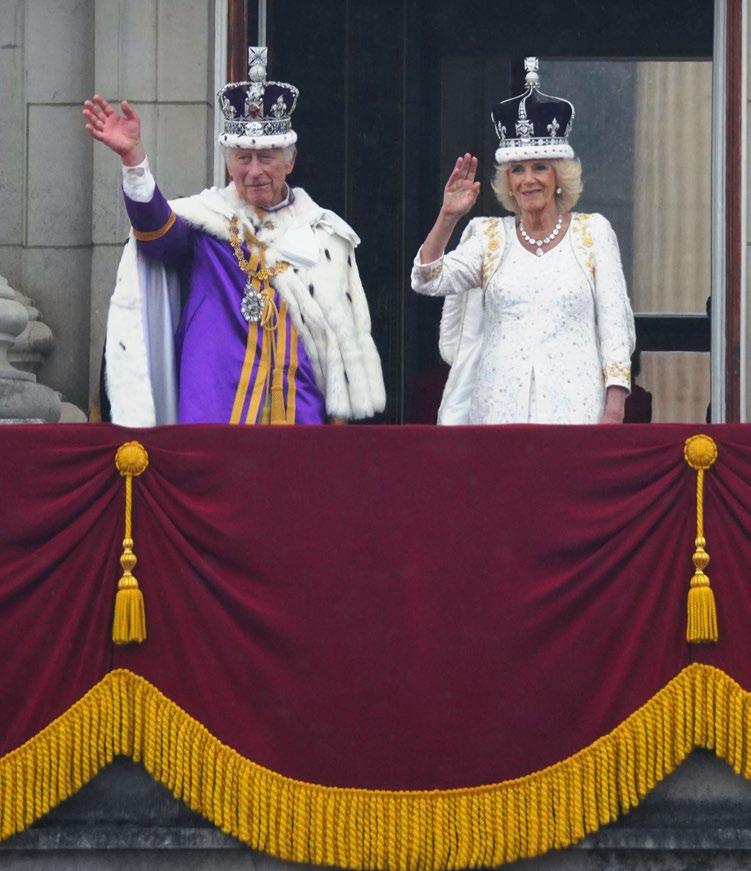
Despite the very British weather on the first weekend of May, London was crowded with tourists flocking to see the spectacle of King Charles III’s coronation. Whilst many criticized the dazzling military and royal processions and the coronation ceremony itself, costing the British taxpayers around GBP 100 million, even the financial benefits, generated for the economy by those attending the first coronation in 70 years, were clear. The UK travel and tourism industry alone saw a boost of GBP 200 million over the coronation weekend and the two-week period either side of it.
A boost in income
Retail sales are usually boosted by such large national events and the long weekend of the coronation was no exception with people travelling to celebrate with friends and family. In 2022, the first week of June that included events to commemorate the Platinum Jubilee of the late Queen Elizabeth, grocery sales alone were GBP 87 million higher compared with the average week of the previous year. As to be expected, the wide range of coronation memorabilia were much in demand, ranging from loving cups, vases, teddy bears, tea cups, saucers, coins and plaques to photo frames, paperweights, jewelry, crystal, mugs or even jigsaws, just to name a few. In London, hotel occupancy over the coronation weekend was at 96%, and the extra income from tourism and spending in pubs over the three-day weekend was estimated at GBP 337 million. All in all, the British economy saw a huge boost of over GBP 8 billion related to the coronation events in one way or another.
People just love these occasions
As several Britons living in Hungary have explained to Diplomacy &Trade, although those things such as camping for five days along the procession route, even in the rain, may seem strange to many, “this is a very British thing and it goes back a very long way, happening at every major royal and state occasion.” Ardent royalists have traveled the length and breadth of the country to be a part of these particular celebrations, while others were just keen to be a part of something historical. The explanation as to why so many tourists flock to Britain is that no other country in the world comes anywhere close to putting on such a show to equal the grandeur and pageantry of these occasions. A highlight of these for many is, without a doubt, the military turnout. Around 7,000 members of the army, navy and air force from across the UK and Commonwealth made a major contribution by participating in ceremonial
activities including processions, the fly-past and gun salutes to mark the historic event. The Coronation Procession from the Abbey back to Buckingham Palace included Armed Forces from across the Commonwealth and the British Overseas Territories, together with all Services of the Armed Forces of the United Kingdom. The Brits and also a large number of foreigners, not only royalists, love the sense of these occasions. This is why Americans love to travel to these royal occasions, as they provide the historic pageantry and age-old traditions which they don't have in the U.S.!
Dress code less flamboyant
Although some people criticized the lavish spectacle of pomp and ceremony, the golden carriages and the robes, etc., most Britons accept that all this is simply part of such an historic occasion and its ancient rites. Also, many expressed their great disappointment at finding out that the royals and the peerage would not be wearing their robes/coronets/tiaras and all the accompanying ‘bling’ as was evident at the coronation of Queen Elizabeth II. Charles planned to have a pared-down ceremony, with far fewer guests invited and overall, a more low-key event in view of the UK’s present economic situation. Therefore, apart from those taking part in the actual ceremony, who did wear their robes, the dress code for everyone else was daywear –business suits and dresses/hats. However, the senior Royal ladies, including the Princess of Wales and the Duchess of Edinburgh did not disappoint! Also, the foreign royals and other female guests provided plenty of fashion interest for the media!

A memorable week-end
The celebrations continued with Sunday’s Coronation Concert at Windsor, attended by 20,000 members of the public, and broadcast to over 100 countries. A long list of stars from the various genres of music gave their services free of charge. Members of the royal family attended –and were seen clapping and dancing in their seats! Monday was the final day of the long weekend. Many people throughout the UK had organized ‘Coronation Lunch’ street parties on the actual day of the coronation, whilst others organized these and similar events for the Sunday and Monday. On Sunday, the Prince and Princess of Wales surprised the locals at Windsor by joining them for a Coronation ‘Big Lunch’ including tasting the homemade ‘Dish of the Coronation’, which was a ‘Coronation Quiche’. This was personally chosen by the king and queen, and prepared by many as the centerpiece of their ‘Big Lunch’ and other community events. Some followed the exact recipe while others made their own varieties. For the coronation of Queen Elizabeth II, the special dish was ‘coronation chicken’, which became very popular as a cold dish especially in the 1970s, often served at weddings, and has recently had a revival. Overall, the events of the coronation weekend more than met with the expectations of the tens of thousands huddled under their raincoats and umbrellas in London, and also the hundreds of millions following the events worldwide. The general consensus throughout the UK was that it was a huge success and a great weekend! Many of those who were watching the processions as they passed by, and the actual coronation ceremony at the various screening sites, expressed their hope that they will also be there for the next coronation – that of the Prince and Princess of Wales.
2023/ IV |DIPLOMACY & TRADE| www.dteurope.com
14 photo by ISAAC MAYNE/DCMS, KATIE CHAN

british focus
A PROVIDENT FINANCIAL SERVICE PROVIDER
PROVIDENT AIMS FOR BUILDING A BETTER WORLD THROUGH FINANCIAL INCLUSION
Provident Financial Ltd. has been a leading player in the personal loan market in Hungary for more than two decades. The CEO of the company, Botond Szirmák, who has been at the helm of the company for 15 years now, tells Diplomacy&Trade about how important satisfied employees and customers for Provident are, their role in financial awareness training and the responsibility they feel towards the society they conduct their business in.
“We are primarily known for our smaller, short term, weekly and monthly repayment loans. Our success is summed up in our company’s mission: at Provident, we believe that everyone deserves a chance to achieve their goals, so, we also seek to bring regulated credit to those groups of society who, for whatever reason, cannot access traditional bank loans,” the CEO highlights.
Security and stability
Provident operates under the umbrella of the International Personal Finance group, a British-based international home credit and digital business. As to what this international background means for Provident and its
clients, Botond Szirmák points out that “first and foremost stability for our clients.” He adds that the fact that the company has an international parent company with a history going back to the 1880s shows that it has a stable and strong background that has stood the test of time. “This can be very important both for us and for our clients because those who borrow are looking for security and stability, and they can find those with us.”
He emphasizes that the international background adds a lot to the company’s work as they are in constant contact with their colleagues abroad. “Our leaders meet regularly to discuss the challenges we face, work together, share best practices and develop
together. The company's purpose statement of ‘Building a better world through financial inclusion’ is also a common denominator.”
Satisfied employees and customers
In recent years, Provident has won the ‘Excellence in Customer Service’ award a total of nine times and was named ‘Best Workplace in Hungary’ three times. The CEO attributes these awards to the fact that at Provident, they have always placed great emphasis on the well-being and recognition of their employees. “We have our own team of trainers who support our colleagues' work and development with an updated training portfolio every year. It is also important to us that our people have a good work-life balance, which is why we work in hybrid working arrangements in our head office, for example.” He explains that their greatest reward is a satisfied customer. “To be satisfied, our customers need a high level of service, full information and an empathetic and helpful adviser to guide them through the loan process, so that they feel that they are important to the company from the application to the moment of repayment. We give our commercial advisors all the help they need to do this.”
Social responsibility at a strategic level
Since the company's inception, Provident employees have spent much of their time volunteering to help educational, health and social institutions across the country. Botond Szirmák underlines that “we currently have around 1,600 colleagues working in the field and they are an active part of the local community in which they operate. As such, they meet many people who need help, whether it's an elderly customer who can't get to the pharmacy to get their medication or a young single mother who is struggling to make ends meet. These genuine bottom-up volunteer initiatives, which we often take up at a regional level, are completely pervasive in the way our company operates.”
At the same time, Provident also addresses the issue of social responsibility at a strategic level. They feel that as a responsible company, it is important for them to give back to the society in which they operate. “That's why we have launched the ‘Invisibles program’ in all the countries where we are present, with the aim of highlighting the groups whose members are invisible for financial services. Among other things, we work with the Hungarian Interchurch Aid who understand where help is needed, and we support them with cash grants, donations and volunteers,” the CEO points out. The main focus of the assistance at the company is financial awareness training, which they try to introduce into the cooperation in a sustainable way. They also put a lot of emphasis on this towards other groups, as research shows that Hungarian society has a lot of catching up to do in this area. “We are in the best position to increase financial awareness through our personal presence with our clients,” he adds. Another example is the story of the Ukrainian footballer Dmitry Nazarenko, or Dima, who fled from Mariupol to Hungary. Back home, he had a professional U19 contract and his dream was to become a professional footballer, but as a refugee, he didn't have many chances. “His case is a good example of our company's mission that everyone deserves help to achieve their goals: when we heard about his case, we took him on board, helped him find a team in Hungary and gave him a scholarship to focus on football, realizing his dream,” Botond Szirmák stresses.

Sustainable responses
It has been almost a decade since Provident was involved in the creation of the Figyelő Community Benefit award. As regards the purpose of this recognition and the criteria used to select award winners, the Provident CEO highlights that the aim was to encourage Hungarian businesses to provide innovative and sustainable responses to social and environmental challenges and to create products or services that are also best practice, particularly in the fields of infrastructure and business development, renewable energy, sustainable food, education, health and culture. The winners are selected each year by a Board of Trustees composed of prominent figures from the national economy and public life.
2023/ IV |DIPLOMACY & TRADE| www.dteurope.com
16 photo by PROVIDENT
british focus
MAKING TOBACCO HARM REDUCTION A REALITY HAS NEVER BEEN MORE IMPORTANT
Reducing the harm associated with smoking has become even more important during the COVID-19 pandemic. Public health bodies are more focused than ever on wider health issues and how they can improve outcomes while making the best use of their resources. Minimizing the negative public health impacts of smoking cigarettes remains a major challenge that many are trying to tackle, with some countries, such as the UK, setting ambitious targets for the complete elimination of cigarette consumption. The real question is: how can they achieve this effectively?
We know from experience, such as the US prohibition of alcohol, that simply banning popular consumer products does not work. The reality is that people continue to smoke, despite being aware of the harmful health risks. These are the smokers who would benefit from greater access to alternative products that can effectively deliver nicotine and provide a potentially less harmful alternative to smoking. This is the group for whom effective tobacco harm reduction policy matters the most.
It is widely known that the best thing people can do to protect their health is not to start smoking or to quit smoking altogether. For those who would otherwise continue to smoke, a complete switch to a potentially reduced risk alternative may be an option. Products that contain nicotine but do not involve combustion (the burning of tobacco at up to 900 degrees Celsius) emit far fewer and lower levels of toxicants compared to conventional cigarettes and have the potential to be less harmful to health. The availability of smokeless alternatives such as e-cigarettes, tobacco-heating products and nicotine pouches are crucial for effective tobacco harm reduction.
A recently published, long-term, randomised controlled trial on the use of tobacco-heating products lends credibility to the harm reduction potential of the entire category of high-quality tobacco-heating products. Even those with reservations can see the benefit in this landmark new clinical study showing that the health risks of cigarette smoking may be reduced in smokers who completely switch to using tobacco-heating products.
This article was supported by BAT Pécsi Dohánygyár Kft. and was created for the purpose of raising social awareness, not for advertising purposes.
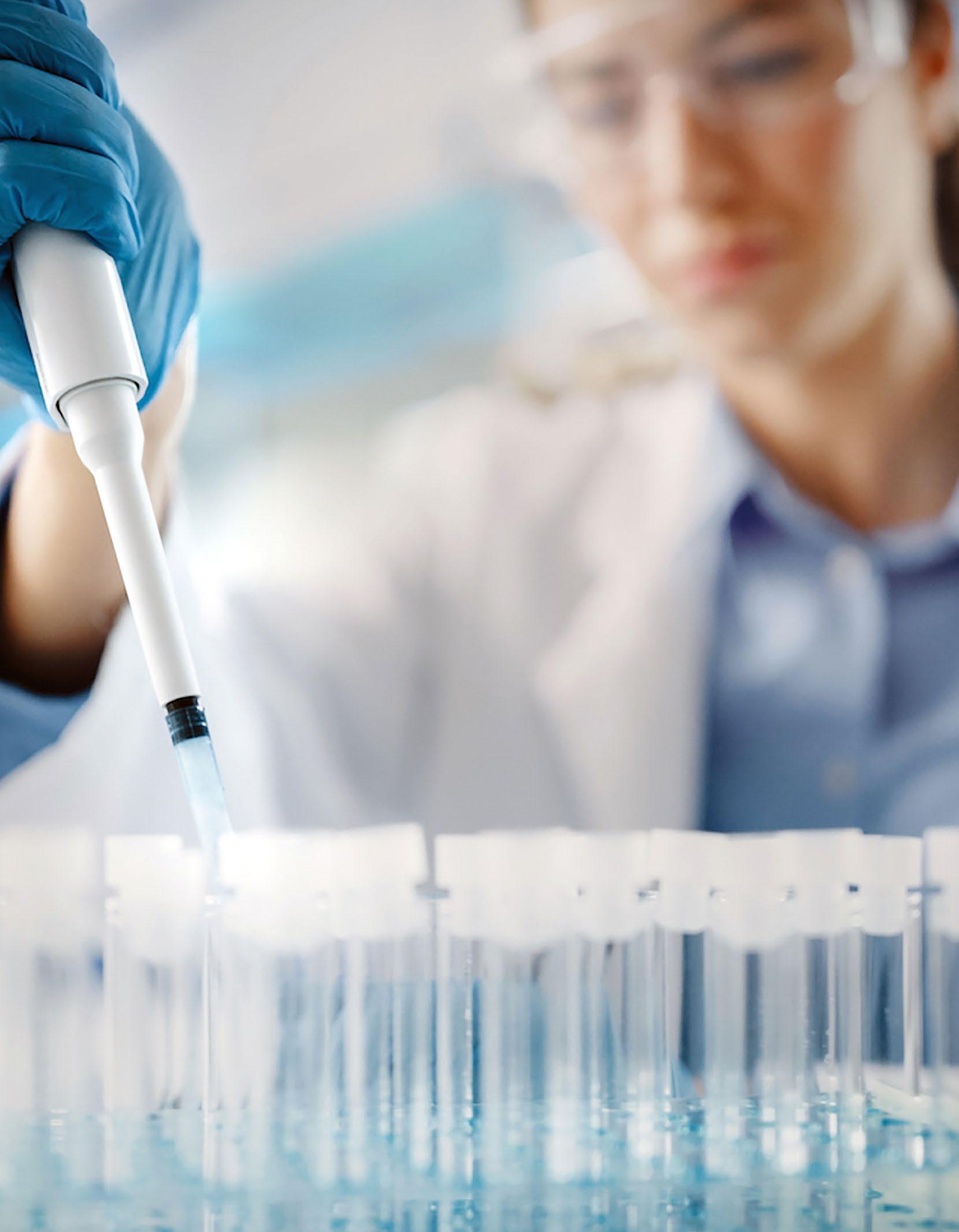
www.dteurope.com |DIPLOMACY & TRADE| 2023/ IV 17 photo by BAT
british focus
BUILDING CONNECTIONS, UNDERSTANDING AND TRUST
COUNCIL WORKS TO MAKE A BIGGER DIFFERENCE FOR THE LONGER TERM IN BOTH THE UK AND HUNGARY
through programs, which they manage in partnership with national governments. They make available high-quality online resources for both teachers and learners of English.
“Our uniqueness lies in the aim that we want to help people improve their language competence and at the same time develop other skills – presentation, cultural awareness, emotional intelligence just to name a few – that can create competitive advantage,” she adds. The British Council’s biggest cultural relations program is exams, which is all about educational opportunity and mobility both socially and geographically.
“We provide innovative and accessible learning and examination experience for Hungarian students and our Cambridge Assessment English Exams have become equivalent to the state-recognized, accredited language examination systems in Hungary. In 2020, we launched online language courses that allowed students to learn English from the comfort of their own homes, and we offer computer-based language exams that allow flexible exam dates and faster results. This has demonstrated the United Kingdom's commitment to educational innovation and supported the UK's ambition to be a leader in digital education,” she adds. In order to accommodate the high demand for its exams in Hungary, the British Council has doubled its computer venue capacity. This has allowed the organization to grow its business, and it is now aiming to increase registrations by 15% in 2023-24.
The oldest cultural relations organization in the world, British Council dates back 89 years and it has been continuously present in Hungary for six decades now. On this 60th anniversary, the recently appointed Country Director of British Council Hungary, Georgina Szilágyi tells Diplomacy&Trade about the organization’s role in the world, its activities in Hungary and the values it represents.
Talking about the almost nine decades of the organization’s history in promoting English language education and that of British culture, the Country Director highlights that “our work has evolved, but we continue to make a positive contribution to the countries we work with. In doing so, we improve the United Kingdom’s international standing, prosperity and security by building connections, understanding and trust between the people in the UK and worldwide.” She adds that it takes time to build trust and they
have been doing this for almost nine decades. “Moving from a process of understanding different cultures to trust between cultures can lead to genuine collaboration. Our ability to innovate and being independent of government allowed us to work for the long term and carry out sincere people-to-people engagement.”
Six decades in Hungary
British Council Hungary celebrates its 60th anniversary this year but this period could have been over seven decades – should political circumstances have been different. As Georgina Szilágyi explains, “the British Council opened in Hungary for a short period after the Second World War but was forced to close in 1950. In 1963, we were allowed to re-enter Hungary under a cultural agreement renewable every three years. The British Council operated as part of the British Embassy until, in 1987, a revision of the agreement allowed it to function in its own right and name. Our role, influenced by the relationship between the two countries and technological development, had changed over the years. Although we work with a smaller team and resources, our role in connecting cultures and brokering relationships remain pivotal.”
Helping young people
Georgina Szilágyi joined the British Council Hungary team as Country Director in December 2022 from the British Embassy Budapest
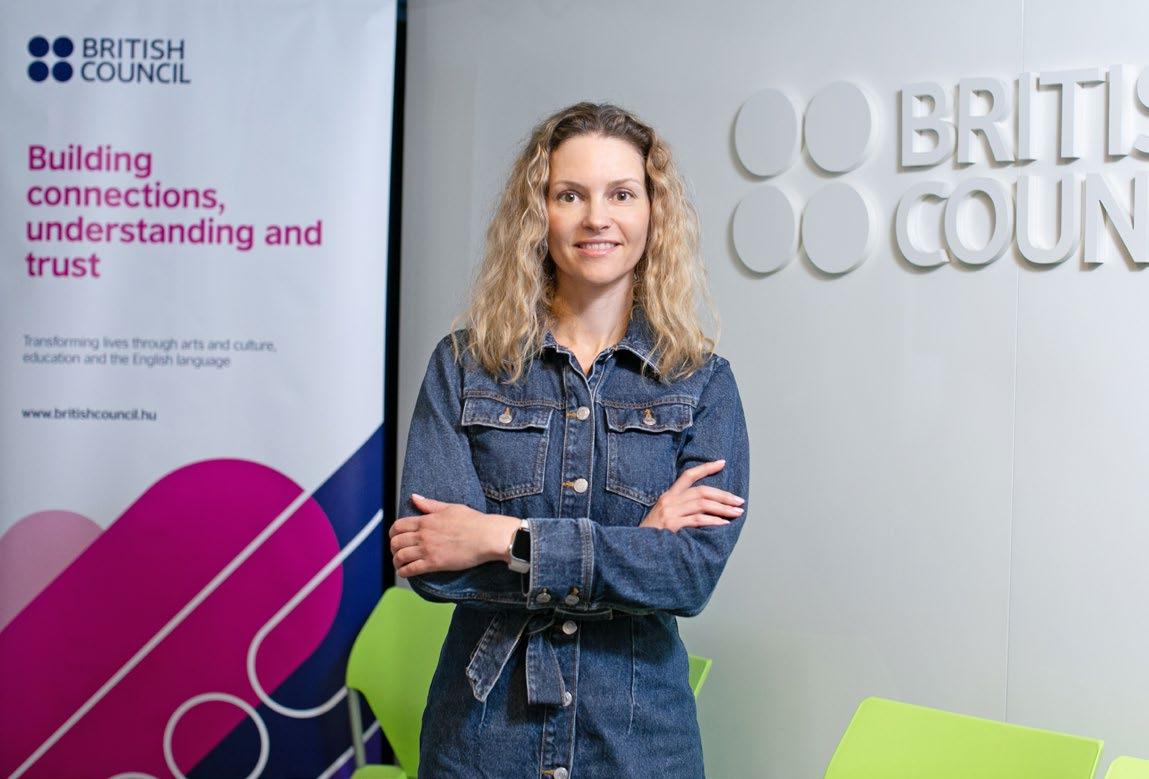
where she had worked in Communications and Public Diplomacy for almost two decades. Regarding her plans in this new position, she says she will continue to build connections, foster new relationships and further expand partnerships through arts and culture, education and the English language. She stresses that “this is not a one-woman show. With my inspiring team, we work directly with individuals to transform their lives, and with the Hungarian government and partners to make a bigger difference for the longer term in both the UK and Hungary. We help young people to gain the skills, confidence and connections they are looking for to realize their potential and to participate in strong and inclusive communities. We support them to learn English, to get a high-quality education and to gain internationally recognized qualifications.”
Unique learning and examination experience
One issue that people definitely associate with the British Council is English language education: courses and exams. As to what the specialty of the British Council is in this field compared to other language schools, the Country Director points out that they promote the English language worldwide, both through their own teaching centers and
Working in partnership
In achieving its objectives, the British Council works in Hungary with a wide range of partners in education, English language and the cultural sector, government, communities and professional associations, alumni organizations, and, naturally, the British Embassy. “Our partnership work involves youth, students, young professionals, artists, and civil servants. Working together we make a bigger difference, creating benefits for thousands of people in Hungary,” Georgina Szilágyi points out.
British values put in practice
The British Council represents UK values such as equality, diversity, and inclusion. Regarding the tools and methods, the organization has at its disposal in sharing and promoting these values in Hungary, the Country Director stresses that these UK values feature in all their work and appear as an overarching theme in everything they do in this country. As for some specific examples, she mentions “catering for special needs and accessibility when it comes to teaching English and delivering exams, promoting diversity and inclusion via all our program work on social cohesion, climate change and gender equality, working with underprivileged communities all reflect these values, be it capacity building or arts and culture focused.”
2023/ IV |DIPLOMACY & TRADE| www.dteurope.com
18 photo by DÁVID HARANGOZÓ
BRITISH
british focus
VACCINES FOR THE WORLD FROM GÖDÖLLŐ
GSK RESEARCH AND INNOVATIONS HELP THE HEALTH OF BILLIONS WORLDWIDE
GSK (formerly GlaxoSmithKline) Plc. is a British multinational biopharma company, one of the top pharma firms in the world. Its plant in Gödöllő, just east of Budapest, has been developed into a strategic actor in GSK’s global vaccine production.
The histories of the founders of GSK date back well over a century (in fact, Glaxo's predecessors were set up in UK, New Zealand and the U.S. over 150 years ago). As the Managing Director of GSK in Hungary, Martino Grazzi tells Diplomacy&Trade, the multicultural environment has always been – and still is – a characteristic of the company. “GSK has a footprint worldwide, an impact on global health. We are producing medicines and vaccines basically for all countries in every corner of the world, for everyone: regardless of people’s age, gender, ethnicity or need. There are some studies calculating that every single minute, four children out of ten in the world receive a Glaxo vaccine. Just like in the 18th century, when the company’s predecessors laid the groundwork for our future, the willingness to improve humankind's health and impact people’s lives – not only with profitable products – and really get ahead of any kind of disease are still in the spirit of the company.”
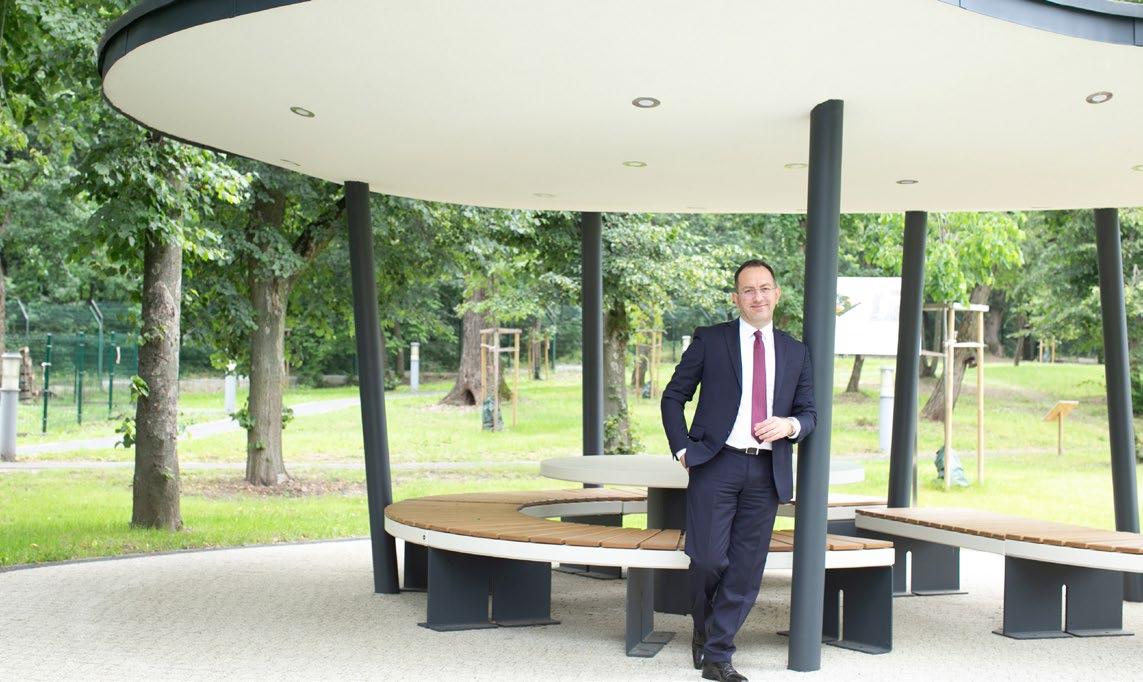
Treating billions
GSK vaccines and other products may help billions worldwide with these people many times not even being aware what company to thank their health for. GSK has been, and still is, a pioneer conducting the research of vaccines and medicines. One of the best known of which are probably the polio vaccines. “Nowadays, it is a disease that is not in the spotlight anymore, except for few wild strains,
thanks to a collective effort to eradicate it, but this was pretty vivid until the beginning of the 20th century, and we were producing these vaccines since the early 1960s. Another example is penicillin, well known and recognized as a game changer in the history of the humankind worldwide. Glaxo was the first to put penicillin into antibiotics. I cannot even calculate the number of individuals who have been touched by the results of our research activity. More recently, innovations by GSK are helping to tackle diseases like HIV, or even more recently, are improving asthma and oncology treatment, for example. The results of GSK research in many cases do not only help treating diseases but also prevent them,” the Managing Director points out.
GSK in Hungary
GSK has a dual “soul” in this country. It has been present in product distribution, but, as Martino Grazzi highlights, its presence as a manufacturer is equally relevant nowadays. It was in 1954 that the 'Humán' Vaccine Production and Research Institute was founded in Budapest, the first such establishment in Hungary, with its production facility set up in Gödöllő in 1966. In the 1970s, this institute was authorized by WHO to sell for exports. “A couple of decades later, in 2001, Glaxo decided to acquire this pharma plant and establish, a year later, the first, let's say, milestone for its journey in Hungary as a manufacturer. Indeed, last year, we celebrated
the 20th anniversary of this presence. Since then, huge investments have been made by the company to maintain the state-of-the-art standard and bring here the technology and the competencies required to manufacture what was in scope at that time. Nowadays, we have here around 340 talented people producing tetanus and diphtheria components for GSK vaccines, a quantity equivalent to more than 120 million doses per year, to be distributed worldwide. About 160 countries receive vaccines containing a component made here, in Gödöllő – and we are pretty proud of this!”
Science, technology, talent
GSK is a global biopharma company with the ambition and purpose to unite science, technology and talent to get ahead of disease together. The Managing Director stresses that it is more than simply an ambition, “it's basically embedded in our way of working and in the way of interacting every day. We are bringing to Hungary, which is quite a relevant market for us, innovative medicines, innovative vaccines, for example, for respiratory diseases or for meningitis. However, it is embedded in our core values to really bring innovation worldwide and go beyond, say, the perimeter of the country: values like being ambitious to our patients and being accountable to have an impact on their lives matters for us, every day. Of course, there
is always the willingness to do the right thing, to choose the transparency, to choose the clarity and fairness in every relationship, in every trade or in every interaction that we are going to have. Also, when we are recruiting people, we make sure to have all the talents to contribute to our mission. This applies to our plant in Gödöllő, where we have quite a fertile area to find the right professionals, although it's really a challenging environment nowadays, thanks to the great results of the country in terms of employment,” the Managing Director notes.
Aiming for carbon neutrality
In the corporate world, it is of primary importance, especially in the pharmaceutical industry, to conduct business in a responsible and sustainable way. Martino Grazzi very much agrees with that statement and believes that this should be part of the agenda of every responsible company and every responsible industry. “GSK is particularly interested in these themes, and we want to lead the way on this. In fact, we were one of the companies signing up to the Glasgow Climate Pact (aiming to reach carbon neutrality worldwide by 2030) of the COP26 conference last year. Our CEO, Emma Walmsley subscribed to this commitment at the beginning. And those are not just nice words, they are applied daily in in our decisions – including here in Hungary. Last year, the Gödöllő site received an investment of GBP 2.3 million just to pursue this ambition. We are using this really tangible investment in education and training, and especially to renovate the technology of our site to reach the carbon neutrality target. This is actually just the first tranche of the investment and we will go for a phase two until probably and hopefully, we will be one of the first in the GSK network to achieve this ambition. I think nowadays it's a must for our people, for the local community and eventually for our future.”
Campus-like environment
It is also a principle for GSK to be an accountable and responsible actor even from a social perspective for the country and the neighborhood where it is operating, using resources in a responsible way and paying attention to the future. “Sustainability is not only about utilizing resources like water and energy carefully, it is about doing the right thing and taking active care of the environment where we are operating,” he adds.
GSK is also very keen on biodiversity. “We act in line with a global initiative to maintain – or even enhance – the biodiversity at the site of our plant in Gödöllő. Our staff and visitors alike very much appreciate that green areas with trees and bushes among the buildings make it look like a university campus rather than a manufacturing facility. The atmosphere, the appearance of this garden-like area – all this is made for thanking our guys working here, so, it's really a payback, for us, for our business and for nature” the Managing Director concludes.
www.dteurope.com |DIPLOMACY & TRADE| 2023/ I V 19 photo by DÁVID HARANGOZÓ
british focus
LAND ROVER DEFENDER: CHOOSE YOUR STYLE!

The Defender 110 has a choice of five engines: two diesels, two petrols and a plug-in hybrid. It comes with an eight-speed automatic gearbox, with low-range capability and four-wheel drive as standard. It is a roomy five-seater, although there is space inside for up to seven people with an optional third row of seating. Its Pivi Pro infotainment system is easy to use, quick and good to look at, having – as standard –a curved 11.4-inch touchscreen with navigation, voice control, Apple CarPlay and Android Auto. Options include a roof tent and an inflatable waterproof awning, allowing it to be turned into a camper van. Expedition ‘roof rack’ and side ‘gear’ carrier further improve its adventurous spirit.
A sophisticated explorer
The new Land Rover Defender is the modern reincarnation of the legendary off-roader that created the brand, the Land Rover Series I, inspired by American SUVs after World War II. The Defender, which has won a string of professional accolades, embodies the highest levels of performance, on-road and off-road capability and design.
Ever since it was first introduced, the Defender has remained an icon of power and off-road excellence across the globe. Entirely reborn for the 21st century, the Defender is engineered for those with a thirst for adventure. Both familiar and reimagined, the legendary profile of the Defender showcases toughness while offering endless personalization options to match your personality. Three dynamic powertrain choices, proven off-road characteristics, and groundbreaking innovations help begin the next era of the Defender’s
legendary story. Quintessentially Land Rover, bespoke interior design cues help combine the rugged attitude of the Defender with luxurious comfort to help make the journey more memorable than ever before, the company highlights the most important characteristics.
A wide range of models
The family is a truly individual range of cars that caters for all needs, with models to suit everyone. The short-wheelbase, three-door Defender 90, seating up to six, and the stretched, five-door


110, with the option of a third row of seats, were joined in 2022 by the largest member of the unstoppable SUV family, the Defender 130, which offers unforgettable adventures for up to eight adult passengers seated in three full-size rows. For those looking for a light commercial vehicle category, the versatile and hard-wearing Defender Hard Top may be the perfect companion.
A compact companion for adventure
Even the smaller three-door model, the Defender 90, is no compromise: it's smart, adventurous, practical and safe for the whole family. This short wheelbase, three-door version not only impresses on and off road, but also offers its driver and passengers a unique experience and comfort with the latest innovations. It is as technologically advanced as it is robust. Equipped with mild hybrid technology and available with a wide range of Ingenium petrol and diesel engines, the Defender 90 is available in a choice of up to six-seater versions. Land Rover's new Pivi Pro infotainment system is intuitive and user-friendly. Passengers enjoy a spacious interior, although the body is no longer than the average lowermidsize family car. The key to the Defender 90's excellent maneuverability is its tight turning circle of 11.3 meters. With a choice of 170 different accessories – including remote-controlled electric winches, a roof tent and inflatable waterproof awnings, more traditional tow hook systems and roof racks – it's almost impossible to find two identical Defender 90s on the road.
For off-road enthusiasts
With its perfect proportions, the Defender 110 knows no bounds – whether it's off-road or on the road. It is a perfectly engineered blend of modern conveniences and classical styling. This roomy, luxurious adventure vehicle can work as an everyday transporter. Still, it is an off-road master, more capable than other Land Rover and without the truck-like ride, testers point out.
The largest version of the Land Rover Defender, the 130, which offers unforgettable adventures for up to eight adult passengers in three fullsize rows of seats, opens up a new dimension for the unstoppable SUV family. Every detail shows understated confidence, from the firm stance to the minimalist, refined finishes. The electrified engines include a hybrid inline six-cylinder petrol and two inline six-cylinder diesels. All Defender 130 engines come as standard with Land Rover's Intelligent AllWheel Drive (iAWD) system and a ZF-developed eight-speed automatic transmission. Modern off-road adventures are made more comfortable and safer than ever with the latest generation of online technologies and chassis systems, including an award-winning infotainment system, standard Electronic Air Suspension and Passenger Air System Plus.
Practicality and premium comfort
For those looking for a small car category, the versatile and wear-and-tear-proof Defender Hard Top – harnessing Defender's legendary capabilities – may be the perfect companion as it offers a unique combination of unstoppable ruggedness and 21st century online technologies, providing a unique combination of storage capacity, practicality and premium comfort for business users.
Experience and comfort
Powerful, confident, refined and unmistakable, Defender is the benchmark for rugged off-road performance and is available in a range of versions and three wheelbases. What they all have in common is that they know no limits and, with the latest technical innovations, they offer a unique experience and comfort for both driver and passenger. Thanks to the wide range of models, everyone can find the perfect companion for whatever purpose and whatever the conditions in which they want to use their Defender.
2023/ IV |DIPLOMACY & TRADE| www.dteurope.com
20 photo by LAND ROVER
EACH MEMBER OF THIS LAND ROVER OFF-ROAD FAMILY HAS A DISTINCT PERSONALITY
british focus
BUILDING ON SCIENTIFIC COMPETENCE HERITAGE OF HALF-A-CENTURY
EVERY DAY, EVERY MINUTE, IN EVERY REGION OF THE WORLD, FOUR CHILDREN OUT OF TEN ARE PROTECTED BY A GSK VACCINE. THANKS TO THE POWER OF THE NETWORK, OUR PRODUCTS CAN REACH THE POPULATIONS OF 160 COUNTRIES GLOBALLY.
Our portfolio of vaccines and medicines protects and help people at all stages of life, from birth (via maternal immunization), through infancy, childhood, adolescence, up to adulthood and into old age. To make this happen, we partner and cooperate with leading companies, institutions and experts to provide the best solutions possible.
ABOUT GLAXOSMITHKLINE BIOLOGICALS LTD.
GlaxoSmithKline Biologicals Ltd., based in Gödöllő, 30 km northeast of Budapest, is one of the world’s centers of excellence for vaccine manufacturing. The company has produced vaccine components, bulk antigens and carrier proteins for Diphtheria and Tetanus in Hungary since 2002, building on a 50-year scientific competence heritage, a legacy established by the pharma research firm ‘Humán’ in Budapest. We provide a safe work environment to more than 340 persons while fully complying with Hungarian and international requirements to protect the health of employees and patients worldwide. Gödöllő plays a critical role in supplying vaccines as a strategic provider for the protein carrier used in GSK’s pneumococcal vaccine Synflorix and in the combo vaccines portfolios of Boostrix and Infanrix.
So far, GSK has invested around EUR 170 million in Gödöllő to guarantee stateof-the-art capabilities in infrastructure, technologies, automation, and in human competencies to create a highly professional environment for the manufacturing, development and testing of biological products.

In Gödöllő, we are proud to have a diverse workforce with different nationalities present, cooperating and collaborating in a perfect gender balance. That is boosted by a unique factor in that nearly half of our colleagues have a university degree. Here, engineers, scientists and highly-skilled technicians all contribute to global health and the race to get ahead of diseases together, working every day in a dynamic multinational environment, fully leveraging everyone’s talent, and enabling each individual to keep learning and growing so that we all can thrive.
At GSK, the health and well-being of our employees is extremely important to us. We have initiatives and structures to support this with local gym, well-being program and sanitary assistance, but we are also aware that there will be different challenges for us all, at some point during our lives. This is why we have introduced a global minimum standard of leave, 18 weeks paid parental leave and 4 weeks of paid leave to take care of family members

in need. We want to ensure support to our colleagues so that anyone can thrive both inside and outside of work.
Our care is not just limited to GSK Gödöllő affiliates: every year, our employees have the opportunity to spend one full working day volunteering in line with our social responsibility program called ‘Orange Day’. This volunteer day is donated to the local community to support any institutions with manual work (e.g. nursery homes, kindergartens, schools, elderly homes). During our Orange United Week, we support the international foundation ‘Save the Children’, our employees are involved in various fundraising activities to provide financial help to the foundation. The amount raised during these activities are doubled by the company.
We are actively engaged in protecting the environment, reducing our carbon footprint and our consumption of water and other natural resources. The Gödöllő plant fully aligns with these principles, leading the way in responsible vaccine manufacturing.
At GSK, we unite science, technology, and talent to get ahead of diseases together. We prevent and treat diseases with vaccines, specialty and general medicines. We are one of the world’s largest vaccine companies, with the broadest portfolio of vaccines on the market and a strong pipeline of others in development. We supply more than 20 vaccines to more than 160 countries to help protect people from a range of diseases throughout their lives.

www.dteurope.com |DIPLOMACY & TRADE| 2023/ IV 21
photo by GSK
UNLOCKING THE POTENTIAL OF FAMILY BUSINESSES
do. Rainer Kirchdörfer, Chairman of Germany’s Stiftung Familienunternehmen, believes that employees in a family-owned company do not think in months or quarters, but rather in generations.
“It's not all about profit in these family-owned companies. It's how to bring the companies to the next generation,” noted Kirchdörfer, who set up the foundation 20 years ago with his partner to bring the thought and the vision behind familyowned companies in Germany to the whole European Union. The foundation supports the Center for Family Business at Corvinus University in cooperation with the Péter Horváth Foundation. Hungarian family businesses encounter a set of unique challenges, dr. György Drótos, Associate Professor at Corvinus University, said at the conference. Their smaller size, limited visibility, and fewer financial opportunities put them at a disadvantage compared to larger counterparts. Furthermore, concerns raised by employees, such as limited career prospects, commuting difficulties, and conservative corporate culture, contribute to the struggle family businesses face when trying to attract quality workforce.
The 5th International Family Firm Conference organized by the prestigious Corvinus University of Budapest, brought together experts and successful business leaders from Hungary and abroad to shed light on the immense potential of family businesses in Hungary and the challenges they are facing. The conference, where the main focus was HR activities, delved into the reasons why working for a family business is an attractive proposition, explored the keys to success for small and medium-sized enterprises (SMEs), and addressed the obstacles they must overcome to thrive in the international market. As the backbone of the Hungarian economy, family businesses are poised to make a significant impact, but they need to adapt and embrace change to realize their full potential.
The 5th International Family Firm Conference highlighted the immense potential of family businesses in Hungary's economy. While facing unique challenges, family businesses can thrive by embracing professionalism, modernizing HR practices, and fostering a culture of trust and innovation. With government support and the exchange of experiences between countries, Hungarian family businesses can position themselves higher up the value chain and contribute significantly to the country's economic growth. As they adapt, evolve, and inspire the next generation, family businesses are shaping the future of Hungary's business landscape. “When we talk about small and medium-sized enterprises (SMEs) in Hungary, most of them are actually family businesses. This also means that where there is family involved, people have a heartfelt interest in something. That obviously brings a
different attitude compared to when the company is run by a manager, whose qualities may be equally good, but who is still an outsider in a sense,” said János Berényi, former Consul General with the rank of Ambassador to Germany.
Uphill battle for family businesses
A survey conducted in Germany showed that more than 80% of employees are of the opinion that family businesses provide a more favorable working environment than larger corporations
FAMILY BUSINESS: A HEARTFELT INTEREST
János Berényi's connection to Stiftung Familienunternehmen dates back to the years between 2015 and 2021, when he was Consul General with the rank of Ambassador in Stuttgart.
"In this position, I have, of course, had the pleasure of meeting top leaders of the German economy, including Rainer Kirchdörfer, who is the current Chairman of the Stiftung Familienunternehmen. I also had excellent relations with his predecessor, Professor Brun-Hagen Hennerkes.
They asked me to help them, through the activities of the Center for Family Businesses, which they also support financially at Corvinus University, to further impress upon people's minds that when we talk about small and medium-sized enterprises in Hungary, most of them are actually family businesses. This also means that where there is family involved, people have a heartfelt interest in something. That obviously brings a different attitude compared to when the company is run by a manager, whose qualities may be equally good, but who is still an outsider in a sense.
This feeling and experience, which has been there for hundreds of years, is harnessed in Germany by family businesses, which have grown out of this size and are now among the largest. The foundation wants to transfer these experiences and best practices within the framework of Corvinus University. In Hungary, unfortunately, 40 years of communism did not allow this kind of organizational development. And after this period, it was too late to start."
Professor Drótos noted that Hungarian family businesses are also exposed to a less favorable economic environment for micro, small, and medium-sized enterprises (SMEs). With near-full employment and a demographic downturn, finding skilled workers becomes increasingly difficult. Furthermore, multinational corporations often lure away the talent pool, posing a threat to the growth and sustainability of family businesses. Rising wages are particularly burdensome for small family companies, making it challenging for them to compete in attracting skilled employees. "If you look at the outflow of labor, we are in deficit, with more skilled workers leaving than coming in. It doesn't help that the workforce is being siphoned off by the multinationals, by the mega-investments. From the perspective of family businesses, the jobs thus created are more of a threat," according to the expert.
The
allure of multinationals
A survey presented by Professor Drótos revealed that more than 60% of family business leaders believed it is significantly more difficult to compete with multinational corporations for talent in the labor market. However, it's not solely external factors that hinder family businesses. Many of them prioritize finance and accounting while underestimating the importance of human resource (HR) management. The lack of emphasis on HR and the prevalence of family members in key positions undermine positive changes and perpetuate a perception that multinationals offer better working conditions and career opportunities.
Dr. Éva Vajda, Adjunct Professor at Corvinus University, emphasized the need for family businesses to adapt their organizational cultures as they grow. Smaller family businesses excel at fostering a culture of mutual care and personalization, which can be compromised
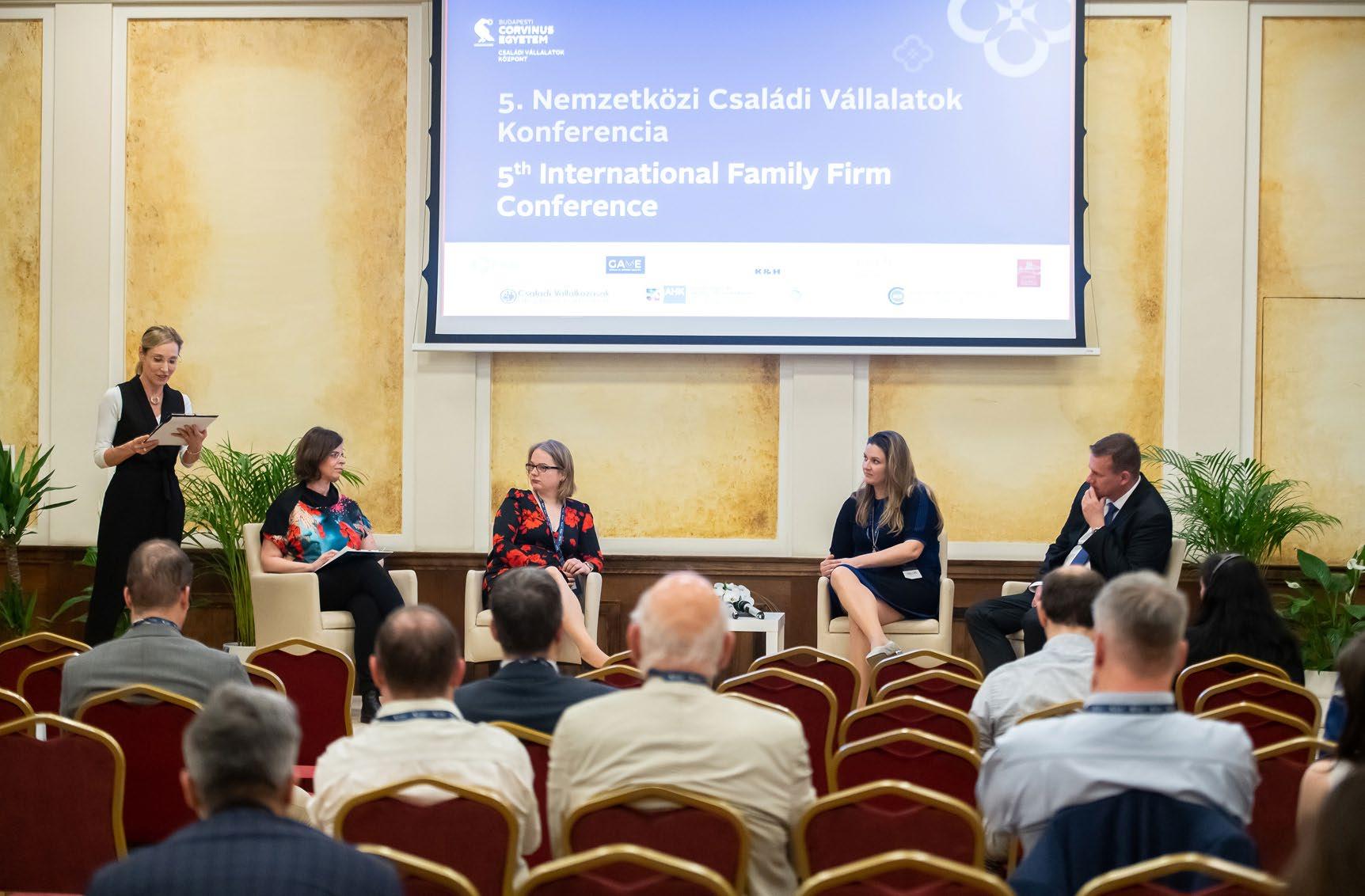
2023/ IV |DIPLOMACY & TRADE| www.dteurope.com
22 photo by ISTVÁN BIELIK
business
FAMILY FIRMS SHAPING THE FUTURE OF HUNGARY'S BUSINESS LANDSCAPE
FAMILY BUSINESS IS A QUALITY INTERVIEW WITH RAINER KIRCHDÖRFER, CHAIRMAN OF THE STIFTUNG FAMILIENUNTERNEHMEN
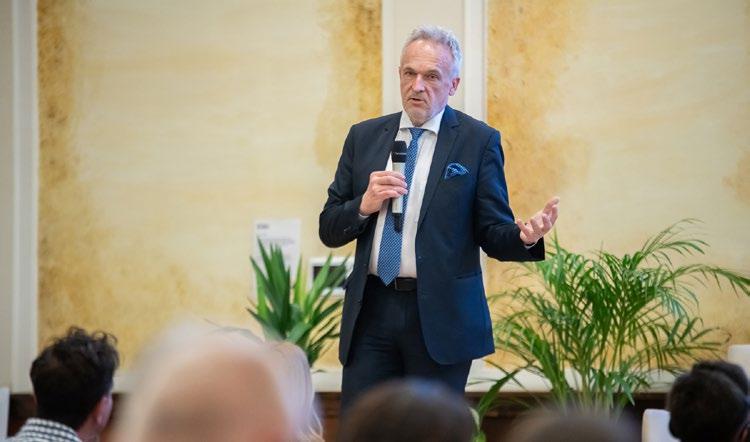
How did the idea of the foundation come about?
My partner and I set up this foundation 20 years ago. Our purpose was to bring the thought and the vision behind familyowned companies in Germany to the whole European Union. We thought – and are still thinking – that doing business as a family in a family-owned company is totally different from business made by stock-listed international globalized companies. In a family-owned company, you are thinking not in months or in quarters, you are thinking in generations. This long-term thinking makes a difference.
It's not all about profit in these family-owned companies. It's how to bring the companies to the next generation. It's a tight connection to the employees what has made family-owned companies so successful. We have advised many family-owned companies over these two decades and they said “look, we are successful, we are the most successful kind of companies here in Germany but the newspapers and other media only presents the negative side of the family. When there is a problem in the family, the Bild Zeitung and FAZ is full of information and they don't bring out the positive side.” We are here to do something for the reputation of family-owned businesses. That was the purpose of our founding.
How successful has it been spreading your ideas in the European Union?
Let's start with Germany. I think we have been one of the most – perhaps, the most – successful organization founded in the last 20 years for bringing forward this form of doing business. We started with about 20 or 30 business owners gathering in a living room of one of the owners where we presented our vision, our idea. Today, we have about 700 family-owned companies who support the foundation, and the average size of these supporting firms is about 4,000 employees. So, it's a big circle of family businesses and our purpose is to research the specifics of family businesses. Worldwide, we look at the differences in how family businesses are doing in 21 countries including Germany, Japan, the United States, the United Kingdom and others. Thus, we have more than 200 studies concerning different issues and items, and we have all these studies made available on our website free of charge.
Is it possible to implement the German model in other countries?
We have an office in Brussels, and we have this department here in Corvinus University, the Center for Family Business, a small co-investment with the Péter Horváth Foundation. I believe that when you look at this issue, first you have a look at the families, and then you have a look on the different situations for family businesses in the different countries. When it comes to entrepreneurial families, the problems and the challenges are the same in Europe. It's the same research we do concerning Hungarian families as we do with French families or German families, because the problems which the families are bringing to the companies are the same. There are problems in between family members, there are problems with family who live abroad, there are problems the family has with an investment in a family business compared with possible investments in the stock market, for example. We research these problems, we make studies on how to solve them and we make proposals to the government on what the framework of business needs to be to resolve these problems. So that's the same all over the European Union. However, when it comes to the specific markets businesses are operating in, the situation is totally different.
The Hungarian market is totally different from the German market for family-owned businesses. Still, when we have the chance, we bring to mind that family business is a quality, not a question of science.
How can your foundation help in putting all this into practice?
It is a difficult question. There are organizations interested in the science part only. They are doing research, they are working with universities, they bring out studies, and only scholars are reading these studies. Our approach is totally different, the most important part of our organization are the entrepreneurs. We have 60 entrepreneurs on the curatorium, or advisory board, of our foundation. These people are owners of big companies, with many of the big brands in Germany represented. The curatorium also includes the representatives of smaller companies as well as researchers. For example, the former president of the Fraunhofer Institute is a member of this body, which also includes some former politicians. Together, we establish what the long-lasting questions and problems for familyowned companies are. After having extrapolated these problems, we go into research and then we make a study and then we put these studies into practice. The transfer happens through conferences, but also face-to-face discussions with scientists, with entrepreneurs, and also with politicians. Thus, I believe that the transformation between theory and practice in our foundation is very good.
as formalization takes hold. The challenge lies in striking a balance between maintaining the family-like nature of the business while embracing the professionalism associated with multinational corporations. Building a strong corporate strategy, integrating HR practices, and providing a sense of belonging, developmental opportunities, and clear career paths can help retain talent and ensure long-term success.

Navigating generational change

One of the pressing issues facing Hungarian family businesses is the transition from one generation to the next. Unlike more developed economies with established traditions of handing down family businesses, Hungary lacks such a framework. László Palkovics, President of the Széchenyi István University Foundation, stressed the significance of this problem, as nearly four out of ten Hungarian companies are grappling with generational change. Sharing experiences and knowledge between German companies, with their long-standing family
Buyer:
VAT Number:
Address:
Name:
Phone:
E-mail:
PAYMENT BANK TRANSFER
Account No: Unicredit Bank 10918001-00000106-89200006
Please, invoice me at the address:
Date:
Signature:
www.dteurope.com |DIPLOMACY & TRADE| 2023/ IV 23
business
SUCCESSFUL BUSINESSWOMAN SZABINA TOMÁN ALSO SPOKE AT THE CONFERENCE
DR. GYÖRGY DRÓTOS, HEAD OF THE CENTER FOR FAMILY BUSINESS AT THE CORVINUS UNIVERSITY OF BUDAPEST, INSTITUTE OF MANAGEMENT SCIENCES, AND MAIN ORGANIZER OF THE CONFERENCE
witty leaks
WITTY L E A K S
IN THIS SERIES, DIPLOMATS SHARE PERSONAL ACCOUNTS OF THEIR EXPERIENCES ON “EXCURSIONS” into Hungarian

AJOURNEYOF ENRICHMENTAND FRIENDSHIP
EGYPTIAN AMBASSADOR THOROUGHLY EXPLORES THE HOST COUNTRY

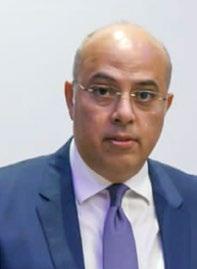 BY MOHAMED EL SHINAWY, AMBASSADOR OF EGYPT
BY MOHAMED EL SHINAWY, AMBASSADOR OF EGYPT
As I stepped into the role of the Ambassador of Egypt to Hungary, little did I know that this opportunity would lead me on a remarkable journey of discovery, cultural immersion, and friendship. From the moment I arrived in Budapest in September 2021, I was captivated by the country's rich history, architectural beauty, and warm reception from the Hungarian officials and the diplomatic community. Allow me to take you on a visual and narrative journey as I recount the unforgettable moments of my tenure as ambassador.
Budapest: a city of beauty and life
My first glimpse of Budapest left me awestruck. The city's magnificent architecture, spanning from historic landmarks to contemporary structures, created an enchanting atmosphere that seemed to whisper tales of a glorious past. The iconic Parliament building, with its neo-Gothic splendor, and the majestic Chain Bridge, elegantly stretching across the Danube River, left an indelible mark on my soul. Yet, it was the vibrant energy and bustling streets that truly brought Budapest to life, making it a city brimming with vitality.
Cultural richness and gastronomic delights
Hungary's cultural wealth revealed itself in myriad forms. Budapest, the cultural hub of the country, offered a treasure trove of museums that showcased art, history, and scientific discoveries. Each visit deepened my understanding of Hungary's rich heritage and its invaluable contributions to the world. But it was not just the museums that captured my attention; Hungary's culinary landscape was a revelation. Every dining experience became a journey of flavors and cultural exploration, with diverse restaurants offering cuisines from around the globe.
Pet-friendly Hungary
As a devoted pet lover, I was delighted to discover Hungary's deep affection for animals, particularly dogs. The warmth and acceptance extended to my own two beautiful dogs, Lily and Leo, was heartwarming. Hungary's pet-friendly policies and welldeveloped infrastructure ensured that my dogs were just as comfortable as I was. From numerous parks to dedicated dog-friendly spaces, Hungary provided ample opportunities for exercise, socialization, and an inclusive pet culture that made me feel right at home.

The diplomatic community
The diplomatic community in Budapest welcomed my wife, Ingy, and me with open arms, enveloping us in a tapestry of warmth and camaraderie. The genuine bonds formed among diplomats created an atmosphere of cooperation and friendship that transcended borders. Ingy found a sense of belonging among the group of spouses of diplomats, engaging in various activities and meetings. Through these connections, we fostered cultural exchange and understanding, strengthening the ties between Egypt and Hungary. Ingy and myself were also lucky that our arrival to Hungary was just after the resumption of the diplomatic activities after almost two years of freezing due to the COVID-19 restrictions.
Exploring Hungary's cities
Hungary's cities, each with its own distinct charm, beckoned me to delve deeper into the country's diverse landscapes and regional identities. From the historical grandeur of Eger, known for its medieval castle and fine wines, to the picturesque streets of Pécs, boasting a blend of Ottoman and Roman influences, every city had a captivating story to unravel. By immersing myself in these regional experiences, I gained a profound appreciation for Hungary's cultural tapestry.
Natural beauty and recreational delights
Beyond the urban bustle, Hungary's natural beauty revealed itself in tranquil parks and captivating hiking trails. Escaping to the serenity of nature became a cherished respite during my tenure. Summer visits to the serene Balaton Lake and Lupa Lake provided moments of relaxation and rejuvenation, reminding me of the intrinsic connection between humans and the natural world.
Thermal Baths are among the ‘must do’ things in Hungary, these baths are available all over the place either in Budapest, Hévíz or other Hungarian cities and towns.
Strategic relationship
Finally, I want to point out that the
bilateral relations between Egypt and Hungary have reached the strategic partnership level. This relationship is further strengthened through the recent exchange of visits between officials. The Egyptian president's visit to Hungary in October 2021 and the Hungarian prime minister's visit to Egypt in February 2023 highlighted the growing cooperation and mutual respect between the two nations. The economic ties between Egypt and Hungary flourished, symbolized by the contract to manufacture and export 1,350 railway wagons to Egypt. Additionally, Hungary provides Egypt annually with a number of scholarships for Egyptian undergraduate and postgraduate students.
2023/ I V |DIPLOMACY & TRADE| www.dteurope.com
24
photo by EMBASSY OF EGYPT
culture, art, gastronomy & scenery.
MICRO-FOLIE AT THE FRENCH INSTITUTE FRENCH INSTITUTE, BUDAPEST
The French Institute's digital cultural space, Micro-Folie has opened to the public. The treasures of the world's largest collections and all its forms are available to the public interested in culture and learning. Micro-Folie presents the most exciting pieces of the collections through a unique guided experience for young and old alike.
Thousands of digitized works of art – paintings, sculptures, theater performances, etc. – from major French and international cultural institutions are presented in a specially designed space in the French Institute in Budapest, in the context of thematic workshops. Micro-Folie selects from French collections such as the Louvre, the Orsay Museum, the Pompidou Center, the Palace of Versailles, the Avignon Festival and the Paris Opera.
In June and July, Micro-Folie offers five different themed lectures in French and Hungarian, given by renowned artists and experts:
- Paint the art! – Gastronomy in Art
- Paris is my Bakony – The French capital in Hungarian literature
- Sensory Lectures: the vision – a series of interactive art history lectures
- Garden (art) – Barbara Nagy – painter DLA
- Lovers of colors and lights – the most beautiful paintings of Impressionism franciaintezet.hu
PUCCINI: MADAME BUTTERFLY
MADAME TUSSAUDS
PALAZZO DOROTTYA, BUDAPEST
After Hollywood, London, Tokyo and many other major cities, the world of Madame Tussauds is revealed in the Palazzo Dorottya in downtown Budapest. Visitors are brought up close to international superstars, world-famous Hungarians and historical figures in an entertaining setting. Madame Tussauds Budapest is the world's 24th Madame Tussauds production. The tourist attraction features 51 Hungarian and international characters.
Madame Tussauds is a 250-year-old global tourism brand. The Budapest exhibition presents the wax work of Hungarian historical figures, stars, sportsmen, cultural icons and a worldfamous Hungarian scientist: Harry Houdini, Katalin Karády, Lajos Kossuth, Franz Liszt, Béla Lugosi, King Matthias, Mihály Munkácsy, János Neumann, Barbara Palvin, László Papp, Sándor Petőfi, Ferenc Puskás, Sissi, King St. Stephen, István Széchenyi and Jimmy Zámbó, among others. Visitors from Hungary and abroad will also be able to see life-size replicas of Bud Spencer, Chuck Norris and Peter Falk in Budapest, the only place in the world where they can do so.
Among the foreign celebrity wax figures are those of Pope Francis and the late Queen Elizabeth II, as well as statues of Beyoncé, Sandra Bullock, George Clooney, Tom Cruise, Penelope Cruz, Chinese President Xi Jinping and others. madametussauds.hu
JULY 1, 4, 6 AND 8, 2023, HUNGARIAN
STATE OPERA HOUSE
The story of Cho-Cho-San and Pinkerton is one of the great tragedies of love. In the story of Madame Butterfly, who considers 'temporary marriage' to be a real emotional and legal bond, the only way out, after losing the last shred of hope, is death. It has been said of the work that inspired the libretto that "if the drama were not set in an exotic location far from us, the pain would be unbearable."
For opera lovers, Puccini's magnificent music takes the tragedy to cathartic heights. Puccini’s opera in three acts is presented at the Hungarian State Opera House four times in early July in Italian, with Hungarian, English and Italian subtitles. The orchestra of the Opera House is conducted by János Kovács. opera.hu
ANDREA ROST AT VESZPRÉMFEST
JULY 12-15, 2023, JESUIT CHURCHYARD, VESZPRÉM
Hungarian opera singer Andrea Rost will perform on four consecutive evenings at the VeszprémFest premium music festival. At the July 12 concert, she teams up with cimbalom player Miklós Lukács and festival goers will be able to witness the special musical collaboration of two extraordinary artists. From Handel to the Portuguese fado, from Erkel to Hungarian folk songs, the worldrenowned opera singer and Hungary’s most virtuoso cimbalom artist will welcome guests who are open to a crossover with musical surprises and further guests during the evening’s show.

On July 13, the pupils of Andrea Rost’s master class will take to the stage to perform piano parts of Mozart’s The Marriage of Figaro. The participants of the PályaStart Masterclass, organized by the Andrea Rost Art Foundation, introduced the young, staged and fresh version of the opera excerpts for the first time at their closing concert at the Hungarian Liszt Academy. On July 14, the audience can see Andrea Rost and her guest – The diva and Men – perform arias and theater monologues. This amusing production, written by Attila Lőrinczy, will feature six popular arias sung by Andrea Rost accompanied by the piano – from Mozart to Lehar, and from Verdi to Ferenc Erkel. Between the arias, the artist’s actor partner will present the six typical male characters of the opera world with short dialogues and monologues: the manager, the critic, the tenor partner, the director, the conductor and the fan. It is a collaboration between the Summer Theater in Szentendre and the Andrea Rost Art Foundation.
On July 15, Andrea Rost and the Budapest Hot Jazz Band will perform their show Dalok a lányszobámból (Songs from my childhood bedroom). The globetrotting diva will this time experiment with a lighter genre and perform formative songs from her childhood and youth. Among others, there will be songs from Pál Széchy and Sarolta Zalatnay, but the great hits of Marlene Dietrich, Judy Garland or Hanna Honthy will also be performed – all of which accompanied by the Kossuth award-winning Hot Jazz Band led by Tamás Bényei. veszpremfest.hu
photo by FRENCH INSTITUTE OF BUDAPEST, MADAME TUSSAUDS BUDAPEST, VERA ÉDER, VESZPRÉMFEST 25 www.dteurope.com |DIPLOMACY & TRADE| 2023/ IV
READY FOR SEASON 4?
It has been four years now that the Villány wine region brought to life the brighter face of Villány, and REDy has been thriving ever since, thanks to the enthusiasm of producers and the positive feedback from consumers. The COVID-19 pandemic took its toll on the brand and on the HORECA sector as well: the red wine destined for bistros, restaurants and pubs was quarantined for almost a whole year. In sync with the resumption of life, the latest vintage of the community bistro wine has been launched to conquer lovers of lighter, bistro-style reds.
It may still be a novelty in Villány, but the youngest child, already four years old, can hardly be called a newborn. As the ‘two faces of Villány’, Villányi Franc and REDy complement each other perfectly on the stands at national events, to the delight of those who like light, fruity wines and mature, barrel-aged wines.
REDy
There is life and even some fun beyond 20, just as REDy is not just and exclusively aimed at Generation Y. This wine is for everyone who wants to inject a little youthful fun into busy weekdays or is looking for a light, quality red for a weekend garden party.



The style is constantly being refined year on year, thanks to collective tastings where producers help each other with constructive criticism to fine-tune their products. The 4th series promises a lot of fun, especially if you can taste the whole range at one event. The new vintage was launched during the Pentecost long weekend in four locations: Palkonya, Villány, Siklós and Pécs. There are plans to spread the word in the capital and across the country, at festivals, gastronomic events and themed tastings. This year again, the creators are fully behind the wines:
•
• Mokos Winery
• Vinatus Cellar
• Weimert Winery
Whether this is the final list or other wineries will join the team this year remains to be seen. One thing is for sure: there is a proven demand for Portugieser-based blends. Though they are always happy to do so, winemakers find that there is less need to tell the story behind REDy as more and more customers return to the counters to test the latest REDys. You can find the red Ys on the shelves of wine shops and vinotheques, on REDy displays, on the wine lists of restaurants and pubs and, last but not least, in the wineries.
2023/ IV |DIPLOMACY & TRADE| www.dteurope.com
26 photo by REDY VILLÁNY
wine
THE LATEST VINTAGE OF REDY HITS THE SHELVES
• Teleki Villány
• Gere Tamás & Zsolt Winery
• Günzer Tamás Winery
• Hárságyi Cellar
Maczkó Róbert Winery
PROVIDING THE SENSE OF BELONGING
THE FOUR SEASONS HOTEL IN BUDAPEST STANDS OUT WITH A STRONG IDENTITY

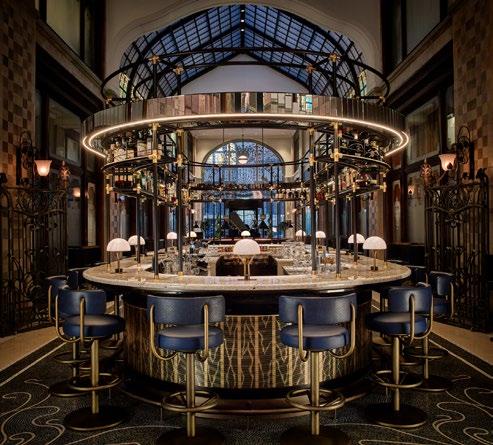
Thibaut Drege has been the General Manager of the Four Seasons Hotel Gresham Palace in Budapest since January this year. He tells Diplomacy&Trade about the importance of creating bonding with the clientele who appreciate the prime location and comfort of the hotel but even more the friendly experience provided by the staff.

“This hotel is a gem in terms of architecture – a gem that I enter every day, looking around, marveling at the many details as I'm someone who loves art very much. I have the feeling to be working in a piece of art,” Thibaut Drege says in amazement. However, it is not only the building he is impressed by but also by Budapest. “This is a beautiful city with amazing history and architecture. I've been extremely surprised, in a good way, in terms of what Budapest has to offer. Actually, my experience has been the same as that of most of our guests telling us how much the city and the hotel have surpassed their expectations. So, I'm personally extremely happy to be here, really proud of working in such a beautiful environment with such an amazing hotel team.”
Not a copy-paste hotel
The Four Seasons Budapest has become one of the best meeting places in Budapest, where politicians, businessmen and celebrities like to sit down for a coffee. The General Manager attributes this to the identity the hotel possesses. “You are not coming to one of these copy-paste hotels that could be anywhere. This is a hotel with a history, with an identity. I believe it is not only the quality of service but also how personalized we are and how detail-oriented we're going to be. This place radiates the feeling of belonging, belonging to people staying in such hotels such as Four Seasons. Both the hotel and the city have great history and we are here to create the history of tomorrow.”
Paris experience implemented
Thibaut Drege arrived from the Four Seasons Hotel George V in Paris, the flagship of the hotel chain. He believes that it is not only one of the best hotels of the company but one of the best hotels in the world. That is due not only to the people there, it's also about the willingness to reach one’s best potential. “This is what I'm bringing here in Budapest to a hotel, which has already been extremely successful and has had great talent as well. The Four Seasons Hotel George V offers an excellent wine selection, for instance. Then, how about the superb wine selection we have here in Budapest? I was extremely surprised to find some of these wines, which even in France are sometimes difficult to obtain.” He adds that based on his Paris experience, he is to bring the whole team and this whole hotel to further heights “as we really need to ensure that we reach excellence and we stay relevant in a very
dynamic market by which I don’t mean Budapest and Hungary only but the luxury market in which we don’t need to follow trends – when we are working in such an environment, we create trends!”
Prime location with identity
The Gresham Palace, housing the Four Seasons Hotel in Budapest, is not just another 5-star establishment. “We are not only a hotel, here you see people stopping by to visit the building. Being right in front of the Chain Bridge, overlooking the Buda Hills – this is the prime location. I love architecture and I can say that this Art Nouveau building is a gem, which has a very strong identity and I think more and more of this is what people are coming to see. Of course, it's easy to build beautiful hotels if you have the money. However, having the chance to operate something, which has a strong identity, a strong personality as this building has, is something completely different. There are small stories here like the one about the architect who was in love with one of the tenants of the building. Just look around, there are hearts everywhere. I think these are small things that make this hotel even more interesting,” the General Manager points out.
Bonding with the clientele
A good hotel does not only provide accommodation but also culinary specialties. KOLLÁZS in the Four Seasons Hotel in Budapest is a vibrant and contemporary European brasserie with a brand-new gastronomic concept. For Thibaut Drege, it is of key importance that they are not operating a restaurant for the hotel guests only but they want it to be enjoyed by the local community as well. “Our guests in the hotel are looking for a genuine and authentic experience within an environment where they are not only surrounded with international travelers. We celebrated the anniversary of KOLLÁZS this June and it was amazing to see it completely packed – none of our regulars would miss such a celebration! Indeed, there is also a clear and strong bonding with our clientele and the restaurant. Food and beverage being extremely important, creating a gastronomic destination, whether it's a restaurant such as KOLLÁZS or a bar such as the Múzsa, is also key to attract travelers.” Going back to identity, he reiterates to have a clear and strong concept that people are going to be interested in. “Most of the time guests don't tell me they love the hotel because of the great view or the amazing location or because beds are so comfortable. Of course, they value that, but what they tell every single day is how the team went beyond expectations to make sure that they provide an exceptional service and an exceptional experience.”
Competition helps
In the near future, the range of 5-star luxury hotels in Budapest will be expanded with the W and then the St. Regis but that competition does not seem to worry Thibaut Drege at all. He feels very much optimistic and safe, saying that this is an opportunity because those brands are also going to bring a lot of their own clients who are going to actually enjoy, discover the city and promote with ‘word of mouth’ what Budapest has to offer. “The presence of luxury hotels within a certain space is not about stealing guests from each other but it's really about working together to promote the actual luxury destination. I think St. Regis, for instance, is actually going to help us to continuously position ourselves into that very luxury segment and also to promote Budapest, which is still not recognized at the level as it should be. If there are more luxury high-end guests coming to the city, most likely there will also be more luxury players, such as retail brands, appearing here, which is going to be very good for the city, and thus, very good for the Four Seasons.” He stresses once again that the beautiful building of the Four Seasons hotel would not be enough without a highly engaged team aiming for excellence and that he will definitely strive to be the best in the city with the team he has here. “It is them who have built the success of this hotel for 20 years and who are extremely engaged in the future of the success of this establishment, embracing the philosophy of this company. It is the same story in Paris where there is so much competition with amazing hotels opening there. Some of our guests went to try these out but they all came back. The same in Budapest: our guests, when I meet them, they don't talk to me about the comfort of the bed, the view, etc. but rather about team members who remember them and take care of them during breakfast every day, or the room attendants who had some small gesture showing that we care and that we really aim to go beyond the expectations. Our guests come back because of these people.”
hospitality www.dteurope.com |DIPLOMACY & TRADE| 2023/ IV 27
photo by CSABA BARBAY, ENIKŐ VÁRAI































































 BY MOHAMED EL SHINAWY, AMBASSADOR OF EGYPT
BY MOHAMED EL SHINAWY, AMBASSADOR OF EGYPT








